#and once again like. I Do Not see retcons as inherently bad. You just have to ask what they are in service of
Explore tagged Tumblr posts
Text
One really annoying argument ppl keep bringing up when someone complains about lore in Veilguard not making sense considering the other games is "Lol that game (da:o, most often) came out 15 years ago, it's fine if they want to change stuff!" but like... girlies, I don't think it's Origin's fault that Veilguard took 10 years to make and decided not to use what was already established.
#and once again like. I Do Not see retcons as inherently bad. You just have to ask what they are in service of#I actually did like the retcons about the Qun and trans people in Inquisition#but the '3 elves per clan' rule also from DA:I was an insanely crafted argument to demonize the Dalish (even more)#so when people say stuff like 'it's kinda weird that the Crows are treated as heroes now when we knew them as slavers'#I don't think you... get to simply say 'lol it's fine to change stuff!' because it's an immersion breaking and confusing change#moreover it really flattens them as a faction#we could have seen how the new members dealt with that aspect of the organization and reckoned with what it means that they are in it at al#instead of realizing this is the criticism's goal you're... telling us to headcanon it away#or read between the lines in a book that should not be Literally Required Reading to keep up with a game that cost 70 dollars?#you guys are not serious people. to put it mildly#Games#DA:TV
10 notes
·
View notes
Note
My fandom hot take is: Ace Attorney has legal corruption as a theme and no idea what it's doing with it. It starts as a pretty straightforward "the legal system is unfair and slated towards the defence, prosecutors care about nothing but guilty verdicts and routinely forge evidence, you are the underdog attorney performing miracles" before retconning that the two major prosecutors implied to have forged evidence didn't do it on purpose after all, instead pinning it on higher officials, which at once widens the scope of the universe and makes the corruption run much deeper, but also somewhat "exonerates" the prosecutors of their more blatant wrongdoings (although not of all of them). And then after that, it makes two defence attorneys, including our heroes, into forgers, which itself is never retconned. And then there's this whole impersonating officers thing and it just goes completely sideways. It makes no sense. It's fascinating.
A really interesting question! The thematic inconsistency in Ace Attorney is really palpable, despite having some of the most comprehensive stories, so I'm with you on this one
Strongly agree | Agree | Neutral | Disagree | Strongly disagree
There are many, many Doylist reasons as to why the theme of corruption gets thrown from one side to the other, but saying that "Well yeah DD is kinda shit without nuance because it wasn't written by Takumi" would be a low-hanging fruit in terms of criticism. So I will try to compile my scattered thoughts about this topic here with another approach.
Seems like as a series Ace Attorney has this "protagonist biased" fault. We are rooting for Phoenix when he tricks Furio Tigre with the bottle. And we are supposed to be mad at Edgeworth for coaching Bellboy to deliberately misinform the court. And considering that, we can't even say that the series tried to imply the "defense attorney always good, prosecutor always bad" type of mindset - despite being first and foremost a game with a necessary element of satisfaction of defeating a malicious foe - because in the very first game there's Robert Hammond. And some time later we see Klavier Gavin. Apollo was a protagonist, so presenting the bloody ace was never called out. Meanwhile Edgeworth has entire drama around him handling SL-9. So that's why in my opinion this is exactly protagonist bias, when you win a game against Edgeworth and prove that this pink suit indeed tried to coach Bellboy to give a false testimony you get a portion of serotonin. The same serotonin runs through your brain when this sleazy new lawyer character gets caught.
But when you think about the grander scope, the things start getting sketchy.
In my opinion, it all can boil down to one sentiment, that again stems from the essence of this series - it's a game, and a story with black-while morals (yes, even games like Apollo Justice are pretty clear cut about who's in the right and who is not in my opinion). So it's a given that the protagonist will do things for the good of others. And the antagonists (which are often the prosecutors) will hinder that objective. So it's much more understandable that Phoenix will use tricks when he was trying to corner a loan shark who manipulated many people, or when he tried to bring the man who ruined his career and lives of others to justice. And with Edgeworth in SL-9 and Manfred in IS-7 is more like a flashback material, a foundation that have its story being built upon. SL-9 was a past case that doesn't quite have this urgency of saving a friend. And Manfred tried to put an innocent man in the jail anyway. I don't really like both of these (in my opinion) retcons, because they make the things unnecessarily complicated and REALLY rob Miles and Mandfred from their agency in some capacity whatsoever - but your writeup makes me think that my distaste could be precisely because these plot points have some serious implications which makes the inherent story structure of AA to bite more than it could chew. Anyway "you can use some tricks if it's helping people" is a pretty concise message that may encapsulate this conundrum...
...which is understandable in a game and a heroic, but an utter rubbish if we detach ourselves from the protagonists' POV. Like, even Edgeworth was truly believing he's doing the right thing in his early career. Besides even the "helping other people" part is fluctuating between different representatives of one profession. Phoenix is called out by Edgeworth in 2-4 becuse defense attorneys aren't heroes and they just make sure everyone is tried fairly. But only 4 games later we got a character who represents this message - Raymond Shie Eddie Fender. I probably derailed your ask beyong possible, but this too, is an argument of how inconsistent the series in its priorities.
I hope there is at least one comprehensive thought about this matter, because this issue is something that could be explored and discussed from very different perspectives... And here I mused about how and why these inconsistencies work, but all in all, I agree that there's no clear-cut stance in the series about what is corrupt and what is not even within one writer team's works
#ask game#ace attorney#ace attorney critical#SPOILERS FOR TGAA but i wanna mention ryunosuke “i will make an enemy out of the entire government to protect my client” naruhodo#which adds to the messiness of it
22 notes
·
View notes
Text
Sception Reads Cass Cain #18
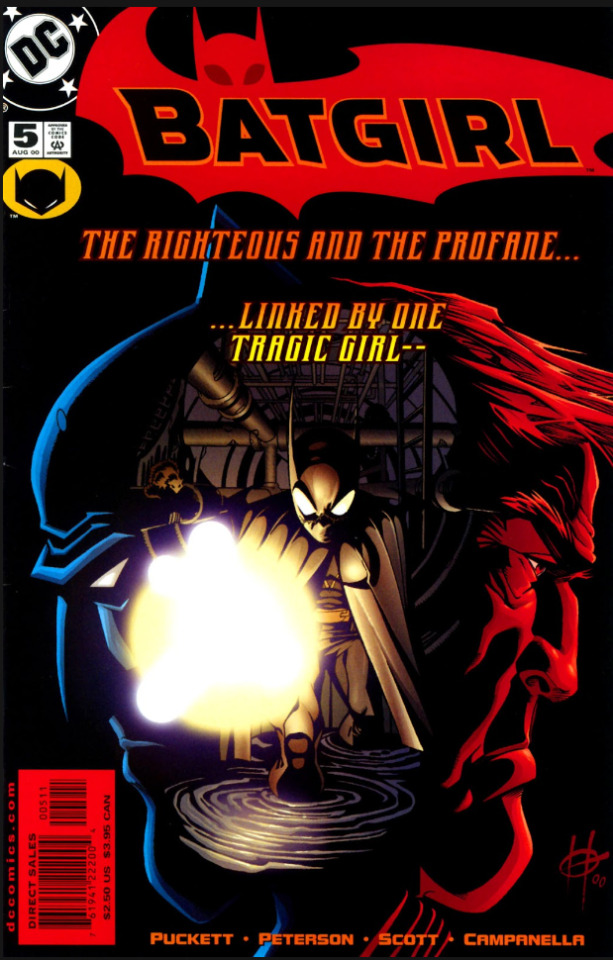
Batgirl (2000) #5 Story: Peterson & Puckett Art: Scott & Campanella
Back to the main series, and we're following straight on from where we left off. I'm leaving my criticisms of the direction taken with issue 4 behind, what's done is done, all we can do now is look at where the creative team goes with it. As with the issue 4 post, I'm trying not to just straight summarize everything, so if you aren't familiar with this series or haven't read it in a while, do please go read through issue 5 again. It's good, it introduces David Cain, there's a clever bit with Cass figuring out how to let Babs know she can understand her now even though she can't really speak yet, the art's still really good. It's worth your time.
The main thing I want to talk about in this post, of course, is David Cain. The flanderization of David Cain is one of the ways Cassandra's stories started to trail off long before her ongoing Batgirl run came to an end, and the fact that none of the multiple creative teams across multiple books that have tried to 'fix' Cassandra thought to try to 'fix' David as well - only pushing him deeper into his two dimensional generic comic villain box - is a big part of why modern Cass has never managed to hook me like old school Cass once did.
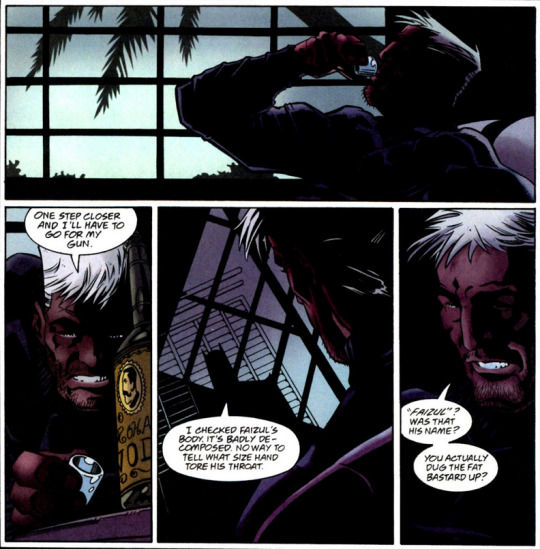
This is our first time meeting him since the introduction in No Man's Land, and after seeing Cass again he's just fallen apart. Drunk, hasn't shaved, hasn't showered. You get the impression that he must have been like this after Cass first left, that it must have taken him years to build himself back up to where he was when we last saw him.
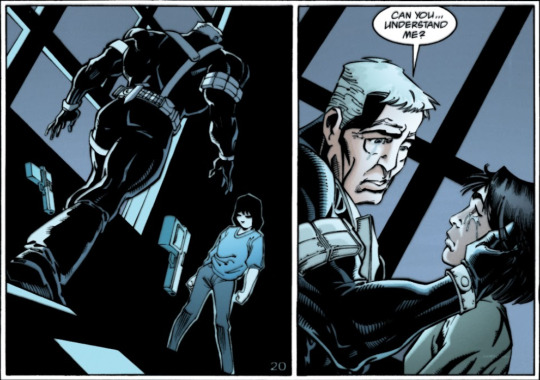
But seeing Cass again, knowing she's alive but that she never forgave him, the shock and hope and despair when she heard her speak - you can tell this guy has this whole twisted self image about being a 'professional' or whatever, but the way hearing her say 'stop' drove all thought of the mission out of his head, and now, months later, he's still like this.
David Cain is a killer, but he's not a killing machine, and Cassandra wasn't just a tool or weapon or product or whatever. Yes, she's a living demonstration and vindication of his 'unconventional' ideas about training, but she's more than that. She's his protege, his legacy, his mark on the world, his daughter. She's everything to him.
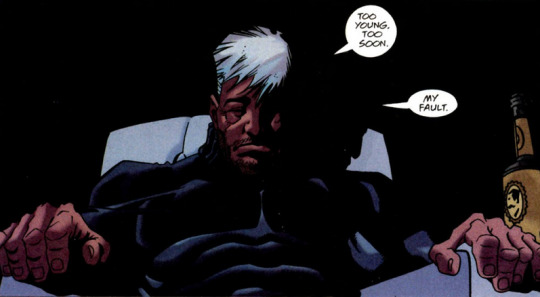
He's not angry at Cass for leaving him, he doesn't blame her for failing him or whatever. It's quite the opposite - he failed her, and he's completely undone by it. This man who's murdered probably hundreds of people and never felt a thing failed his daughter, drove her away, and the guilt from that destroyed him.
And he's right that it was his fault, though he doesn't understand why. He doesn't understand that the very body reading skills that he managed to instill in little Cass forced her to experience her victim's death from their own perspective, forced her to empathize fully with them as they died at her hand, and that is why she could never kill again, why she felt forced to run from David and the life he prepared her for. It didn't matter how young she was, it would have been the same if she were 8 or 18 or 28.
The skills that made her the ultimate assassin also made her wholly unable to be an assassin - a perfect ironic twist that I would have loved to see this asshole react to, but before he could he deteriorates into a stock generic heel who wouldn't care either way.
And worse, we get introduced to other kids trained by Cain with the same skills - so the bit about Cass being the only one it ever worked for is retconned away - and they kill without caring so this core aspect of Cass's character is also abandoned, modern Cass isn't good because she was forced to experience the consequences of her cruelty from the victim's perspective, she's just inherently good because she's just a 'good person', just like modern Cain is just a 'bad person'.
And that's the thing, I'm not praising the contradictions and depth of original David Cain's character for the sake of woobifying an evil abusive father figure. Rather, it's that David's depth directly contributes to Cassandra's depth.
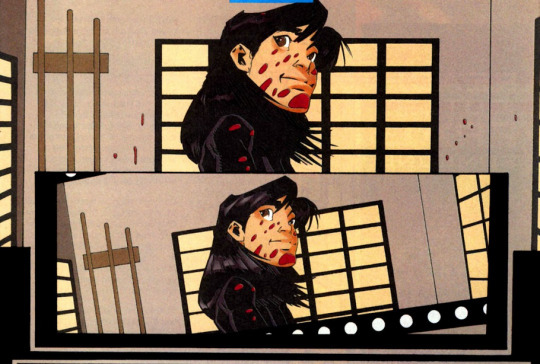
Because little Cass - og little Cass - she loved her life with David. The training was bloody and brutal but she excelled, and her father was proud of her excellence, and she thrived on the praise he showered on her for it. She couldn't wait to beat up 'Merc' and the other goons in issue one. She wasn't cowering in a corner, she didn't beat them up reluctantly out of fear of what David would do if she didn't. She was having fun. David raised her to be the perfect little killer, and she absolutely and enthusiastically was, right up until the killing part.
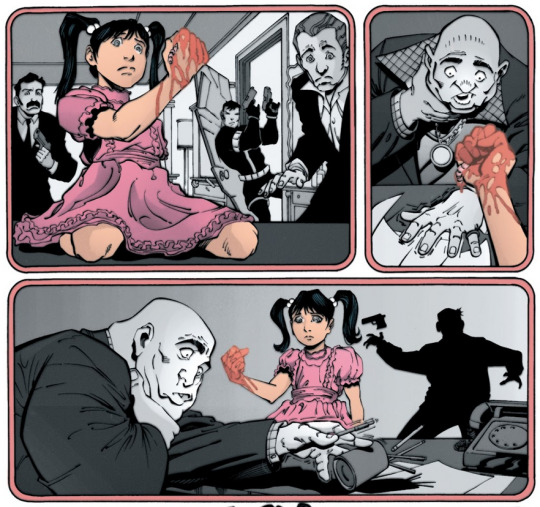
It's important that Cass loved her life with David, that she loved David himself and that he loved her, because that makes her decision to abandon her life and her father a sacrifice. That's her choosing the lives of others over her own happiness.
It means something different if David was just a monster who she hated and feared, if he never actually cared for her, because then abandoning him is her saving herself. It also changes how his murder resonates. OG Cass, this is something she willingly did for David's approval. She only realized after the fact just how terrible it was, but that doesn't change that it was something she willingly and happily did. New Cass, forced to kill out of fear and threat of violence to herself... again, it's not the same.
It also changes what it means for her to be Batgirl, in a way that strips out even more depth.
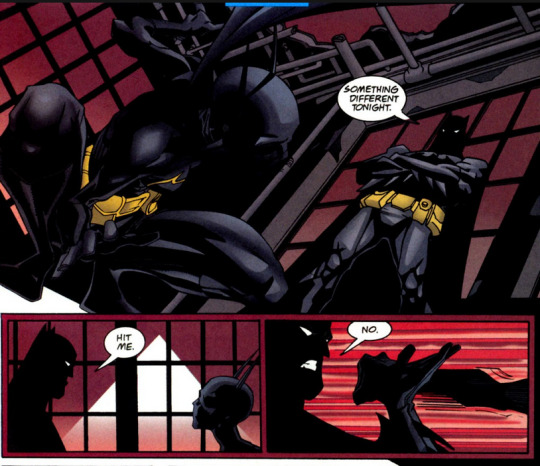
If David Cain is just a villain who abused her, then there's no longer this direct parallel between training under Bruce and training under David, the lives they're preparing her for, the violence, the way she thrives on it, the way she feels guilty about Being Batgirl - like she's getting away with something - because it's basically getting back the life she lost when she abandoned David, the same life she's trying to repent for by being Batgirl.
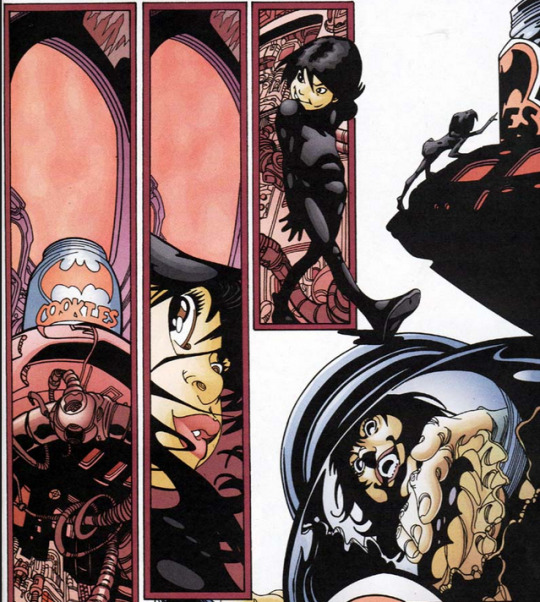
How she has to hide what she did from Bruce or else he'll take away her new life that's so much fun, and with it take away her only hope of redemption. New Cass might feel guilty for killing, but she doesn't feel ashamed for having been excited and happy to do it only moments before.
There is so much depth to early Cass that is directly tied to the depth of early David Cain. Her father is basically one of the founding pillars of her character. But this guy?
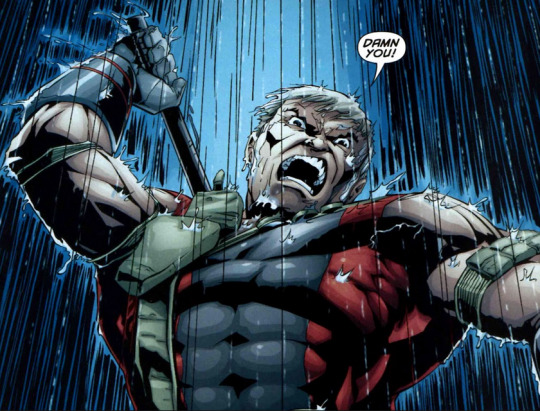
Or even this guy?
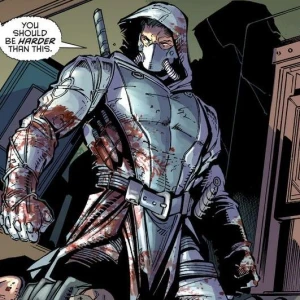
Those guys aren't pillars of anything.
.....
I'm getting sidetracked into negative rants, though, and there's really no call for that, because we don't have to deal with those guys today. At my rate of progress we probably won't have to deal with them ever. For now we have the pleasure of dealing with this asshole...
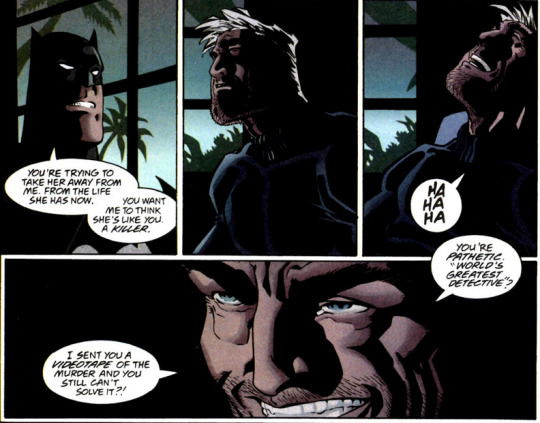
Bruce is right, by sending the footage of Cass's kill David was absolutely trying to drive a wedge between them, while also trying to assert his claim. "You may be putting Cass's skills to use, but never forget that I trained her first, I gave her those skills, and this is what those skills are for." And Bruce's counter argument, "Denial isn't just a river in Egypt, it's also my house where I live at" is so willfully stupid and so funny that David spends a whole panel confused and shocked before he can even laugh at it, and that's honestly pretty great.
David also gets to bring us back to the core theme-
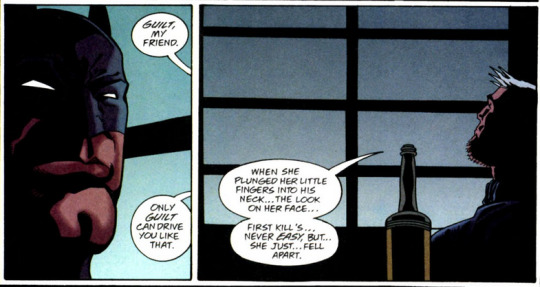
David's guilt over driving Cass away, Cass's guilt over killing that guy, Bruce's guilt over letting his parents die. I don't think Batgirl (2000) ever got around to directly calling Bruce out on that, but panels like this make it clear what parallels we're supposed to be drawing.
....
that's a lot of rambly words about David Cain, there is other stuff that happens in this issue.
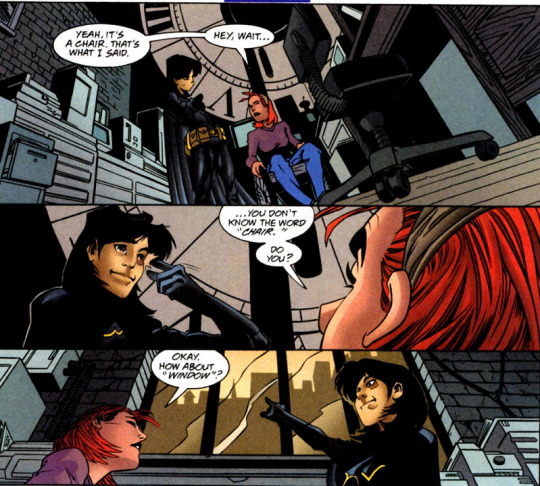
This bit where Cass figures out how to explain to Babs that she can understand her now even though she can't really talk yet, is neat.
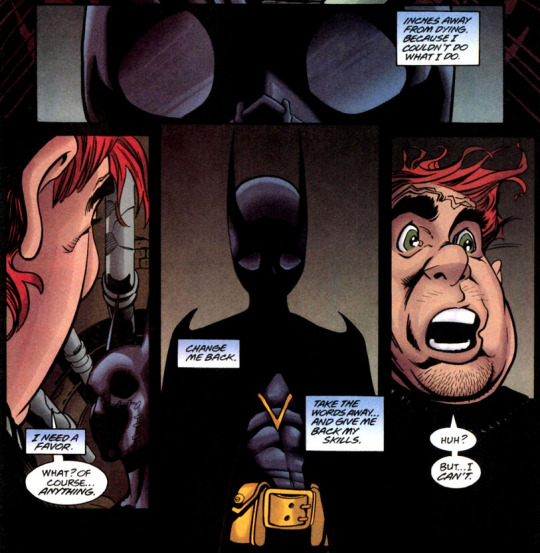
And this bit where Cass realizes other people depend on her skills and she needs to get them back even if it means losing what she's gained is sad and sweet even if it doesn't come to anything since the random psychic wizard can't fix her and eventually she gets her body reading ability back without having to give up speech.
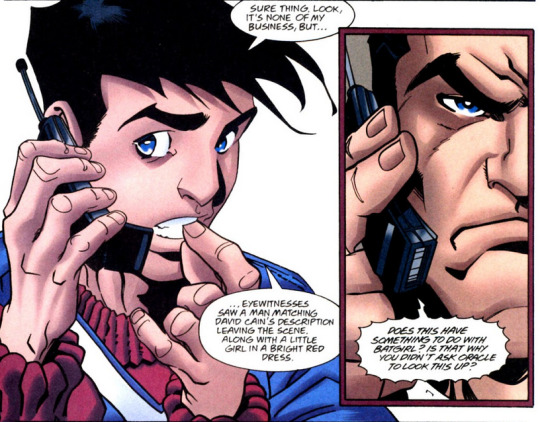
This bit where Bruce has Tim do some research on the guy Cass killed but Tim basically immediately figures out what it's about anyway because, it's Tim so of course he does is pretty good.
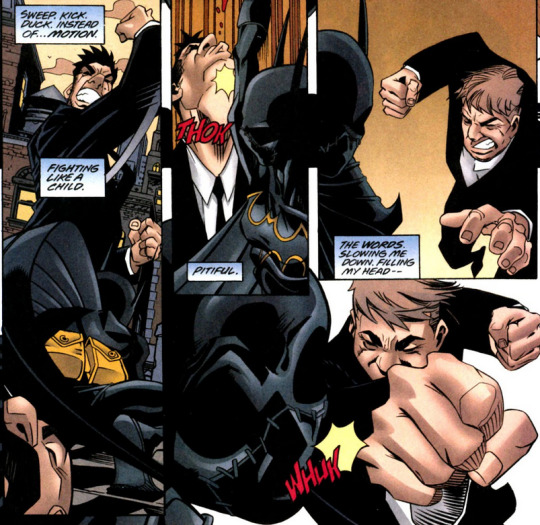
And this bit where Cass struggles to fend off some suited goons she took down without a thought in issue 4 does a pretty good job of conveying how the words are getting in the way... but also makes me wish we had more time with Cass without the usual narration blocks, because... yeah. They get in the way, and it was cool when the book mostly didn't have them.
11 notes
·
View notes
Text
Okay, so Day 9 with Marluxia is where significant lore inaccuracies start.
First of all, we start with Purebloods not releasing Hearts, and Emblem Heartless releasing Hearts, which in DDD becomes the inaccurate retcon of Purebloods not having Hearts, when in fact, they are literally Hearts. Just like how Nobodies are actually Bodies, Dream Eaters are actually Dream Constructs, Unversed are actually aware of their existences, and are based on emotions that are expressed, or "versed".
In the original canon, the reason Purebloods did not release hearts was because they were too corrupted by darkness, as they were fully submerged into the Darkness hivemind, whereas Emblem Heartless, being artificial creations, retained some sense of individuality. Once a Pureblood was defeated, it was assumed given their darkness level they would re-manifest until purification, or purify over a longer time, that we as the player character do not see.
Second is the idea they actually need a Keyblade to collect hearts to create Hearts of All Men, when in actuality, they have been collecting Hearts artificially, as we see in the Heartless Generator, and KH2's script implies Altar of Naught was designed specifically to retrieve purified Hearts away from the real Kingdom Hearts. It is possible that Vexen studied Kingdom Key to achieve this, as he talks before the mission (implying the Keyblades/Keychains obtained in this game are mostly his creations), but even then they were still indeed collecting Hearts, so the statement is just incorrect.
Unfortunately, the plot of the game is built on this incorrect idea.
Third issue is not that big of a deal. Since Marluxia gives you the tutorial of defeating Heartless, this becomes in Union X the idea Lauriam was somehow better than other Dandelions at defeating Heartless, and his quick bond with Roxas was actually a continuation of his bond with Ventus (who is still inside Roxas, not Sora).
This is a weird, though not necessarily bad case of Flanderization (again, tropes are not inherently bad), since the actual reason Marluxia does this is because as the second strongest member of the Org. 13 at the time, and one that desires to have a tool with a Keyblade, he would be most efficient in dealing with Heartless, and would seek Sora's Nobody as he will seek Sora himself in CoM.
(Of course, this event in Days will also be somewhat unimportant, as Union X will imply the main reason he sought after Sora was because he was carrying his original Keyblade, Divine Rose, which like most of the KH1 Keyblades was originally meant to be manifestation of the heart of Beast's Castle's world before the retcon.)
This additional context does not ruin the progression of the story, but weakens characters' actions, which in Marluxia's case is kinda bad, considering he is the brother of our "new" main character Strelitzia, and will almost certainly become a major recurring character both because of this, and his sheer power level.
****
I suppose we should also talk about Marluxia's element, flowers.
While there are many powerful plant monsters in FF, there is no plant-based elemental affinity in any of the FF games, except ironically in Kingdom Hearts. This is different than most JRPGs, where there is a plant element, as wood is one of classical Chinese elements.
There is sort of a Death element, which is characterized by Summons such as Odin, and Yojimbo, but I guess the main reason they didn't want Marluxia's element to be Death is because of the identity of Specter Nobody, aka Strelitzia. However, we cannot repeat plant element of Strelitzia, so we might end up her default to Death instead. More likely though, she will be non-elemental Holy to make her more special.
2 notes
·
View notes
Note
It occurs to me that we never saw kris or suzy in the epilogue (though I think the latter was mentioned once? Idk). Did uh… are they doing decently?
// the darkworld arc had been abandoned/retconned. while there IS a UT-universe version of Kris and Susie (assuming Frisk isn't Kris in UT, tho Kris is still very much their own person regardless) in AFR, we will only know Susie in the redraw. (again... assuming UT Susie is Suzy and not a sister like the catty and catti situation.)
x-x we just know too little about DR we don't even know how the universes mirror each other and the timelines are all WHACK. its a nightmare to write for or even theorize about. i esp dont wanna think about how they'd change in the time skips of AFR.
anyway in the redraw we'll see a LOT more of Susie as Frisk's whole journey is about befriending her. i didn't add her and MK into the epilogue because we need a proper foundation that the redraw will provide. at that point, my Susie would diverge from canon Suzy heavily as her story would be quite different.
uh. speaking of that arc...
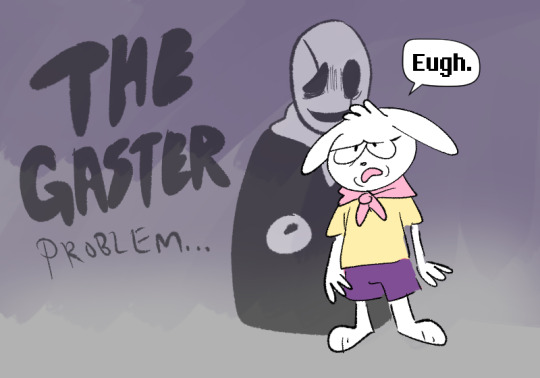
So. My original plan for the rewrite was for Gaster and Riverperson to have worked together in the prime timeline. then gaster got yeeted from time, leaving his work behind. Then, Chara would run away to the underground looking for a purpose and an escape from Asriel's BS and the island. (though, thinking on it, logically Mt.Ebott wouldn't be on monsterland... as that's exiled from humanity. so idk about that anyway)
Anyway exploring true lab Chara accidently uncovers an artificial darkworld and gets stuck as a ghostly narrator again, this time as a cherub with Feylow. Frisk, Susie and MK would be the party and they'd have to make their way home together. I've heavily considered this portion being a fangame-only material, for better play-value.
but uhhhhhhhhhhhhhhhh.
ughhhhhhhh.
ugghghh.... gaster.
The story itself can keep gaster to a bare minimum. The guy is scattered across time. he's not directly involved at all. at most we know he did SOMETHING to chara in the prime timeline with their soul and now things are on the fritz (what caused this AU) up until fake DW, where they're possessed again.
(˘・_・˘)
I just don't want to play with DR canon at all anymore. darkworlds are inherently going to tie into that. and granted, in UT canon there's entry #17 that implies a growing darkness... it's not a stretch that Gaster could of done this. And he DID have a DT extractor, and the timeline is vague but the similar wording (and how old the core is) could imply he was around Chara's time. None of this is a stretch
buuuut working with Darkworld, even if it's a fake one, is too close to DR canon and we just don't know much yet. when i first did the darkworld, i thought it'd be a fun excursion into the same chapter 1 area... but i got too into the improv and imagination side of things without understanding the original at all. (and bad improv) it didn't really hit me that DR was it's own game and lore until Chapter 2, and I realized just how early on we are into that game's story.
I just... I can work with what I've got, I can avoid DR canon as much as I can but ultimately, I'm working with 2/7ths worth of puzzle pieces.
I don't wanna do any of this. Gaster used to be a "free for all" in the fandom to do whatever timeline/lore thing you wanted to pull of cause he was free real-estate. but now DR is treating him more and more as a character and I don't wanna touch the guy as he's going to be jossing the story.
idk what to do in all honesty. The darkworld portion IS important, Chara goes through major character development that the Continue Arc is built on. But I've been struggling with Feylow as a concept, and well, this. what the hell am I going to do.
32 notes
·
View notes
Text
Hello, Stranger (Things)
So, Hamliet finally watched Stranger Things, motivated by the promise of a super hot squid villain I mean, 80s nostalgia and a good story.
Overall, I enjoyed it. Eleven and Max are my daughters, and Will is my son. Steve and Eddie are too pure for this world (so were Alexei and Bob). Robin and Erica are amazing. Nancy is my girl. It is a good story.
The writing itself varies wildly, with characterization inconsistency as the story’s main flaw. Seasons 1 and 2 were extremely tightly written and well done. Season 3 is definitely the weakest, with several characters just doing what the plot needed them to do for Reasons, but it ironically has what was, for me, the most satisfying climax. I also found Season 4, while also having some very, very, very obvious flaws in its writing, the most interesting in terms of themes about the past, choices, parents, and more. We’ll see if they continue to explore those in Season 5. If they do, it could be great.
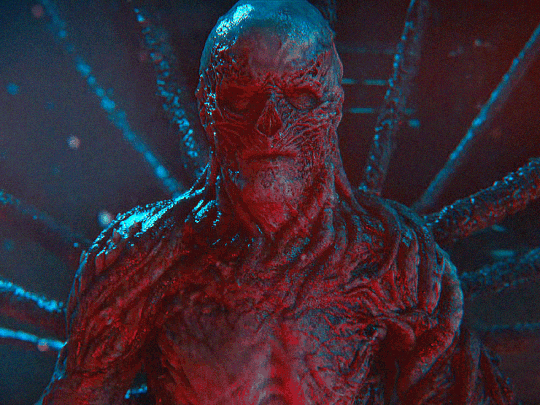
The Part Where I Complain
Y’all know critique’s coming so let’s get it out of the way before I gush about other things and give theories.
Season 1:
The subtext around intercutting shots of Nancy choosing to have sex for the first time with scenes of her BFF literally dying is decidedly Not Great. Yes, I know it is a deliberate flouting of the typical horror movie trope in which the dark-haired girl who has sex gets murdered. But it still relies on this premise that women choosing to have sex for the first time is a negative and results in losing your friends and not knowing who you are anymore.
Season 2:
Season 2 introduces the good victim/bad victim dichotomy between El and Kali, and Max and Billy (which continues into Season 4 with Henry). The writers also don’t seem interested in exploring this deeper.
Also, the writers are addicted to sacrificial death starting this season.
Season 3:
If you thought I was going to complain about Billy’s death, you’re not wrong. But it’s honestly decently done so writing-wise it’s not terrible, and now I’ve complained a bit so let’s go on.
Why did Steve and Billy never interact again? After that fight in Season 2, there was unfinished business. I can only conclude the writers were terrified of the sexual tension. (I kid. Kind of.)
Mostly, here is where the inconsistent characterization emerges. Hopper’s character is the worst victim of this. His arc could have worked, but the execution didn’t. It makes a lot of sense for Hopper to struggle with anxiety and to have all his insecurities stirred up with having a daughter again. But how controlling he was to the point of threatening a child? It wasn’t shown how he got there at all. Hopper deserved a way better arc than acting controlling with El and Joyce without the substance behind that being explored.
Jonathan was also somewhat inconsistent in Season 3, again not because his conflict couldn’t work, but because the writers didn’t put the time or effort into making it work. Jonathan being mad at Nancy for pursuing the rat lead was a bit nonsensical, and then being furious when they lost their jobs--the conversation about their experiences with sexism and classism could be an excellent source of conflict for them. However, it’s brought up just once and then dropped. If you’re gonna bring it up, explore it.
And I know the show isn’t over and these issues could come back, but like. Patience only gets you so far when you’re telling a story in serial format which inevitably affects the experience consuming it.
Season 4:
Why is the Upside Down’s poison air now gone? Do you know how obvious a worldbuilding inconsistency has to be for me to notice and care?
Brenner’s characterization was also a retcon that puts BNHA’s Enji retcon to shame. ~He may have abused and been a monster, but he still really loved them~ The complexity, again, is not inherently bad, but it wasn’t even remotely hinted at earlier and four seasons is a long time to suddenly be like “surprise!” But I am glad El chose not to say she understood at the end.
Ye old "the way the world is is actually a prison and we should change it" is again the ideology of a villain. Like... really, it’s a bit tiring to see revolutionary ideas always framed as dangerous. Not that I’m advocating violence or Vecna’s solution, but. Vecna's making points. Since we can't have that let's show him slaughtering innocents to show us he's wrong even though--well--some of it ain't wrong.
The clear neurodivergent and gay coding of Henry Creel is... here is where I’ll invoke patience. I’m not entirely ready to say I don’t like this yet. It really depends on how the show handles it next season.
The Parts Where I Liked Things
Will’s sexuality (and also, just. Will)
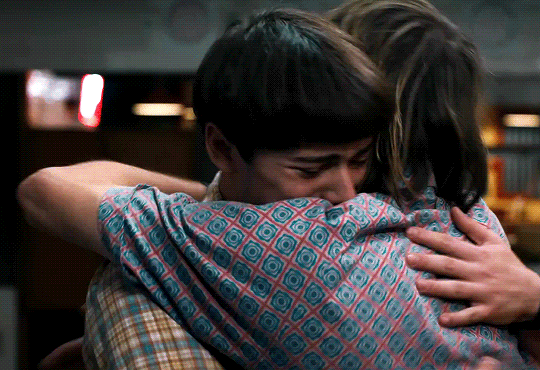
Going into Stranger Things, I only knew a few things. I did know that many people were complaining about Will being a queerbait-y character, and went into the show expecting Will’s sexuality to be a subtextually teased thing that I would complain about.
Not the case.
Even before Season 4 Volume 4, and actor interviews aside, the show is very upfront about Will’s sexuality from like the first 20 minutes of Season 1 Episode 1. If people didn’t get that Will was gay, I’m sorry, but--how? Joyce literally says that he’s “sensitive,” and other kids call him “queer” and other things. Season 3 has Mike directly state that Will does not like girls. Yeah, kids say stupid shit all the time and people develop at different paces, but it’s a story, not real life where we say dumb things that don’t matter. In a story every detail should be important. The writers are trying to set expectations. Something that is repeated multiple times across seasons is obviously intentional. It doesn't need to be spoonfed to the audience be abundantly clear that Will is gay.
The scene in Vol 2 of Season 4 where Jonathan and Will talk--where Jonathan is clearly telling him that he knows Will is gay and he loves him--is beautiful, one of the show’s best scenes.
Give Will a Boyfriend please (Mikhail, anyone?)
But, more on Will later.
Season 4′s Themes
Like I mentioned earlier, I really enjoyed Season 4′s questions about the past, about parents, about the difficulties of growing. Everyone regressed this season: Jonathan being Mr. Mom, Joyce was absent (even w good cause), Max isolated herself, El thought she was the monster again, Steve obsessed over Nancy, etc.
Steve: Too Pure, Too Good For This World
Speaking of Stancy/Jancy... the writers really don’t need to draw out this love triangle. Unless a major retcon is coming (not impossible), Jancy should be endgame as it’s always been set up to be. Steve and Nancy will probably have another moment, but there’s enough weird framing of Steve’s feelings in Season 4 to make me doubt any possible endgame for them. Despite Dustin and Robin insisting it’s true love, Nancy never once said it was love herself, and the problem is that Steve also says--after Dustin has already suggested he get Nancy back--that he would date Robin if she was not a lesbian. Hence, I’m not convinced the story wants us to buy Steve really loves Nancy, or if he just loves an idea of hers.
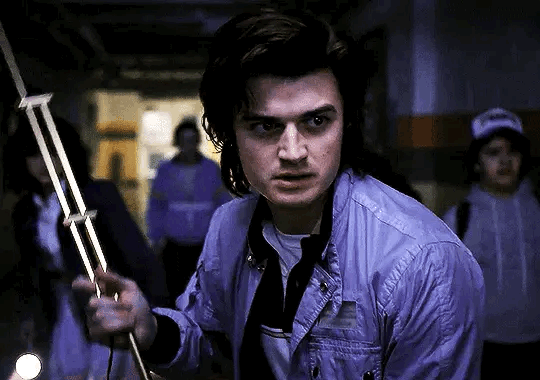
The thing is, Steve already has what he says he dreams of. He wants six kids. Well, that’s ironic considering he has six kids Robin explicitly identifies as “your kids”: Dustin, Mike, El, Max, Lucas, Will. He also says he dreams Nancy is there with them and the kids--and she is. She already is, even if not romantically. My guess is Steve will realize this at the end of his arc.
Honestly, Steve’s arc is a fantastic deconstruction of toxic masculinity. Which... don’t hurt him Duffers. Don’t. I’m begging you.
Max Will Be Fine
Seriously, I promise. Max will be fine. You don’t leave a character in a coma unless you plan to wake them up, unless you’re the latter two seasons of Angel levels of horrifically bad writing which, for all of my complaints, Stranger Things is not.
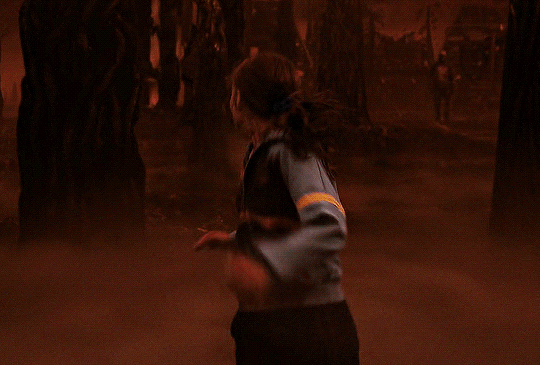
Max is heavily foiled with Vecna (and Chrissy): traumatized, isolated child subject to the whims of their unstable mother. Vecna tells Eleven that he wants them to make their own rules, essentially to be gods of the world. Max, way back in Season 3, tells Eleven that “we make our own rules.”
Max’s words are what El remembers when she brings Max back. No, this isn’t negatively framing El bringing Max back. It’s showing that there might in fact be some nuance. Max’s rules are based in love and friendship, in hope, in love of humanity, while Vecna’s are based in hatred of humanity. To uphold Max’s message--which the story needs to do--Max has to live.
Eleven, I am Your Brother!
Okay, now let’s talk Squid.
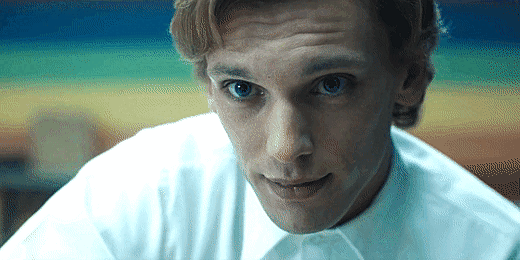
Henry’s whole story is Star Wars. Actually, Season 4 was just Star Wars (makes sense given the 80s stuff). Brenner was Yoda, telling Eleven that she wasn’t ready to leave just yet, that if she ran out to save her friends she’d fail. I know the prequels weren’t until the late 90s-early 00s, but Anakin killing the younglings is clearly the inspiration of Henry’s rainbow room massacre. And Henry’s “join me, Eleven, to build a better world” speech is essentially Vader’s speech to Luke and Kylo Ren’s speech to Rey braided together.
With that said, I fully expect Henry to get some kind of human ending. Will he atone? Don’t think so. But the foreshadowing is pretty obvious. (More on that later.)
Brenner tells El that she and Henry are not alike: “that’s where your similarities end.” Brenner’s the least reliable narrator about this. (Also, you cannot give the abuser--Brenner--a redemptive death and not give that compassion to his victim.)
El and Compassion
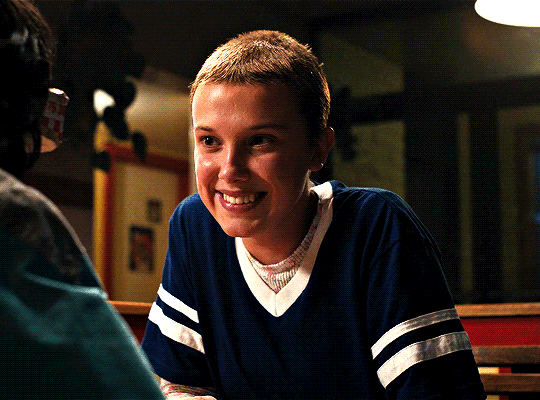
El’s true superpower isn’t her telekinesis. It’s her compassion. It was her compassion, her empathy with the abused child in Billy, that inspired Billy to sacrifice himself. Her compassion saved Will. Yeah, she’s human and lashes out, but she loves deeply. Her compassion freed Henry and then her uncontrolled powers turned him into Vecna (not that she’s at fault; she isn’t). But her compassion should ultimately be what helps save the world.
Vecna himself asks El this. "Why cry for them after everything they did to you?" Well, let's see Vecna. Why does Max cry for Billy? It’;s kind of a theme in Stranger Things. Even without forgiveness (like El not forgiving Brenner), she still acknowledged his humanity. I don’t have to love it to see the theme as it is.
I strongly suspect the main question at the end for Vecna will be "after all I've done to you, why cry for me?" But compassion is what Vecna’s missing, what he lacks in his view of humanity. It’s the true magic of being human.
Henry and Vecna, Unreliable Narrator
Did Vecna choose to become the monster like he proclaimed? Yes. And no.
It’s not a coincidence that an abused child targets other abused, isolated, and traumatized children. Even if Victor loved Henry, his mother was clearly implied to be considering locking him up and lobotomizing him. Like... woof. There’s a lot there subtextually. He’s clearly targeting himself as much as he’s targeting everyone else. I’m not sure the writers will entirely explore this, though. But I do think they will have him experience humanity again. They should.
Honestly, Victor should die trying to save/stop his son. If Victor’s alive, and if he mourns his son--which he does--he should have to consider whether he loves Henry despite everything that Henry has done. If he does, he should try to convey that even if it kills him.
But who will the actual key be to stopping Vecna?
Will as the Key
So, there are two characters--and only two--who have survived the Upside Down for any significant length of time. Vecna, and Will.
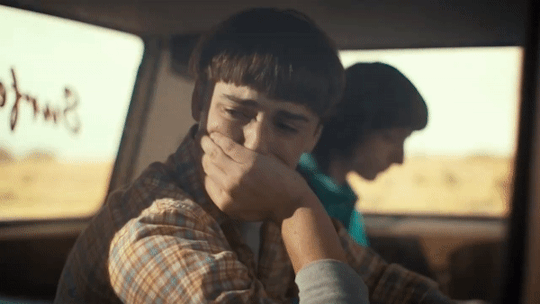
I actually think Will is the one who can reach Henry. It can't be Eleven, because Henry sees her as having hurt him. But a “weak” helpless boy who is an outcast, gay (Henry is absolutely coded this way) and has just been suffering his entire life still choosing love (or even choosing corruption for a time and going back to love/friendship even though I doubt the writers have the balls for this particular plotline)?
Vecna thinks he and El are the two most alike, but it’s actually Vecna and Will. And Will is so human, in everything Henry thinks he hates about human beings. He’s not superpowered. He’s a sad boy in unrequited love with his best friend. He just happens to have a mom and brother who love him.
Plus, tbh, structurally Will should be the focus of season 5. Season 1 was Mike (the heart, which Will called out funnily enough in Season 4), Season 2 Lucas (the mind), Season 3 Dustin (the body), Season 4 Eleven and Max.
Obvious Foreshadowing is Obvious
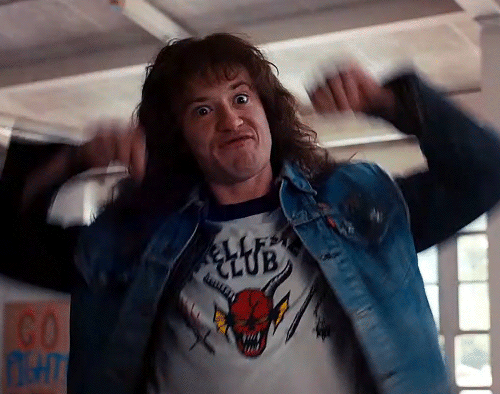
I’m not sure how much clearer the D&D game at the start of Season 4 could be in terms of foreshadowing. 11 couldn’t defeat Vecna.
But 20 did.
How interesting that the three kids still alive are 11, 8, and 1, which totals 20.
Henry--Vecna’s humanity--is probably going to be key to stopping himself. No, I don’t think he’ll get any sort of classic redemption, and he certainly won’t survive it, but I can see him pulling a Zeke Jaeger where he doesn’t exactly repent but still chooses to sacrifice for some bigger goal like destroying the Upside Down or something in a moment of compassion in the end.
#hamliet reviews#they will be fine#max mayfield#eleven#peter ballard#vecna#henry creel#stranger things theory#stranger things meta#stranger things season 4#victor creel#jonathan byers#steve harrington#nancy wheeler
65 notes
·
View notes
Note
ok so this might come off as a bit rambly so please bear with me lol
i've noticed that the acotar fandom has this incessant need to be right when it comes to canon and it really sucks out the funness of fandom. shipping is supposed to be fun but when it comes to this fandom, it's almost like a competition to see who will be more right when the books come out. engaging with theories/predictions about characters and the plot is supposed to be exciting but when it comes to this fandom, some of the theories/predictions are problematic at worst and nonsensical at best. like how can you say with your full chest that you're so confident about where the series is heading in the future because of this or that theory when you're stuck in the past and refuse to see what all of the text is telling you in the present. it doesn't make sense. the selective reading is so strong that it has me looking sideways sometimes lol
i guess my question is why do you think the fandom is so divided when it comes to ships right now? i've seen people say this wasn't the case for feysand and nessian, so what's the difference here?
Oh boy Brielle, I have some thoughts on this. It's complex.
To be clear, I am not saying that this applies to literally every single person who ships a certain way. This is a commentary on the fandom as a whole, and there are always exceptions.
This got really, really long, so I'm putting it under the cut.
I think that one of the main draws of this series, and of sjm's writing in general, is her ships. I think that people get very, very attached to their ships.
I also think that sjm does NOT fully think through some of the choices that she makes when writing. See: the way that she takes from all these different cultures and mashes them together, which could be seen as disrespectful of their origin. She has retconned things, like Mor being queer and Lucien being Helion's son. I think that she thoroughly thinks about some of the aspects of her books, like Rhys's reaction to sleeping with Feyre for the first time, but then really half-asses other aspects of her books, like Mor coming out.
Then, we have your good old misogyny and homophobia - people in the fandom don't like Mor because she hurt the poor bat boy's feelings when she didn't sleep with him, and they don't have a mating bond, but she's never really told Azriel "no", and so every single moment of pain that Azriel has felt in 500 years is Morrigan's fault. And Mor's experience as a closeted queer woman who feels unsafe around the people she should trust the most is completely disregarded by the fandom.
Finally, I think that a combination of these factors has created the monster we know as e*riel, and that the fandom is perpetuating its own mythology.
What all of this comes down to, and the real reason I think that the fandom is behaving this way right now, is that e*riel is dead. It's never happened, it's not going to happen, but because we don't have the clear closure we got with moriel (where people would be accused of homophobia for continuing to ship it), people are still trying to figure out any possible way for e*riel to become canon, though every single sign points to it being a non-issue.
This weird thing where people have to be "right" all the time, and the way that "right" = "canon" is a relatively new development. It's as if everyone in this fandom forgot that they are in fact in a fandom, which inherently diverges from canon.
However, I think that the need to cling to canon is because the alternative would be to admit defeat and say "well, even if it doesn't happen I will still ship e*riel, it's fine, I will live with that." But they don't want to do that. In response, they look at canon so hard that they are reading the white space between the letters to create their theories, which as you noted as largely nonsensical and often fail to take into account who the characters are as individuals, how they are connected to other characters, and why it would or wouldn't be appropriate for them to be involved in various plots.
People could say, as eluciens having been saying since day one, "I really ship this thing but I can see that it might not become canon". But they don't say that. They literally refuse to see any other possibility than e*riel becoming canon.
You pointed out that people are stuck in the past - absolutely. The number of reimaginings I have seen of scenes where either Azriel or Elain has literally zero to do with the scene, but people try to shove one or both of them in there. And this from books ago. People are stuck on the Truthteller scene, and refuse to acknowledge that neither of them have acted on their feelings, whatever those might be, for years. And they ignore the fact that once Elain and Az do act, it goes horribly wrong.
Here are the facts as of right now:
ACOSF is the most recent book. In that book, sans extra chapter, those two had no interaction other than looking at one another.
If we include his POV, then he said it was wrong, we got confirmation that nothing has ever happened between them, she returned his necklace. Elain was aroused, but that does not mean she was ready to even have sex. "Yes" to a kiss is not "yes" to every single sexual act Az can think of. They parted on awkward, bad terms after a scene in which it seemed like they were about to start something. Yikes. Unlike Wings and Embers, they did not end that chapter still thinking of one another. After they part ways, the omniscient narrator does not mention Elain, or Az thinking about Elain, again.
His POV occurs months before the end of the book. They do not interact after that.
Elain has a mate she has not rejected, nor accepted.
So anyway, your question was why are people like this. lol. I think the fandom created a monster, and that monster is clinging to life. It can't accept the idea of morphing into a non-canon ship, though it never was canon in the first place. It had just convinced itself that it was.
There are other aspects to this, that have to do with gwynriel and elucien.
Gwynriel is a new ship, it's almost guaranteed to happen, people are super excited to ship it and give Gwyn all their love. I'm sure they would rather create content for that ship than argue about whether or not it's going to be canon, but they are in constant defense mode. Some people honestly didn't like e*riel before because they don't like Elain, or because they don't like Azriel, and those are valid reasons for not liking it. Why people ship gwynriel doesn't matter. The tone of the discussion is, unfortunately, being shaped elsewhere, which I will mention below.
Elucien is an old ship, older than e*riel. I can speak from this perspective - personally, I have been holding my tongue for 4.5 years. I have been letting people live, and just talking about the things I like. Then when acosf came out, it was like I could finally say all the things I had been thinking about Azriel, because I now had proof that the things I thought about his character (and because of that, about e*riel) now had solid canon foundation. This is 4.5 years of me holding in a lot of shit and finally being able to say it. Sometimes yes, I might take joy in having been right.
I think that a few people are clinging to canon, and that sets the tone for the discourse in the fandom. Someone says "according to page whatever, blah blah blah" and people feel the need to respond, and then it turns into and "I'm right" contest instead of... a fandom... A lot of us like debating. To me, it's fun. But when Person A starts a conversation that's about canon and it actually ignores canon, it's hard to let that conversation go by and just keep creating whatever we want to create. Instead, we respond, and so the tone of the conversation is shaped by what Person A decided to say.
I also think that there is a lack of distinction between theories (what will happen in the future) and meta (analysis of what we have now).
There is also a lack of "I" statements. Opinions are being stated as fact.
idk if there is a way to make it better, other than to just go back to ignoring one another. This whole situation makes me want to throw out every single canon ship I like and create exclusively non-canon content, just for spite. Except I really like doing meta, and so I don't want to. I guess for my point, I'll just keep doing meta, keep creating different content, and keep reminding people that they aren't here to continue perpetuating canon, but to play with it.
77 notes
·
View notes
Note
So, what's your overall opinion on snk 139?
Something doesn’t sit well with me with how people on Twitter are complaining about 139. Personally (Hange backstory aside), it was satisfying and despite what people are saying that it ‘romanticizes genocide,’ I do not agree. I wanted to give my thoughts on the chapter overall so I decided to write it out.
In fact, I have another take on the overall message of the story and I hope people would give this a read.
Disclaimer: Sure, I am defending the story line and the ‘message’ that’s coming with it but I in no way, agree with the genocide. But there is a more nuanced take on this which I think will help people understand that there is an underlying message to all this and I wanted to just talk about it below.
Also, I found some cringe-worthy moments, I do not agree with Armin’s take on ‘Thank you for committing genocide for us’ one of the most horrible lines ever and I like to retcon that and never think about it again and I intend to read the Japanese raws though to check if it was just a translation error.
Maybe there is someone who already explored this but yeah, I’ll just write this in case no one has.
For now though, allow me to give a more detailed analysis of the message over all so people stop hating on the ending for ‘romanticizing genocide’ because I think this is a low key pretty shallow take on the whole thing and I want to provide some information, some analysis and some comparison to make people realize, this isn’t as easy as people claim it to be.
So let me start by mentioning something about the war with Marley to give people some perspective.
Yams pretty much set up a trolley problem on a wider scale and Eren was the one with the lever.
For people who don’t know what the trolley problem is, allow me to explain it below.
Here is a sample I found online: (See this link for details)
“A runaway trolley is heading down the tracks toward five workers who will all be killed if the trolley proceeds on its present course. Adam is standing next to a large switch that can divert the trolley onto a different track. The only way to save the lives of the five workers is to divert the trolley onto another track that only has one worker on it. If Adam diverts the trolley onto the other track, this one worker will die, but the other five workers will be saved.”
There are a lot of variations to this like:
“A runaway trolley is heading down the tracks toward five workers who will all be killed if the trolley proceeds on its present course. Adam is on a footbridge over the tracks, in between the approaching trolley and the five workers. Next to him on this footbridge is a stranger who happens to be very large. The only way to save the lives of the five workers is to push this stranger off the footbridge and onto the tracks below where his large body will stop the trolley. The stranger will die if Adam does this, but the five workers will be saved”
And there are so many other variations of this.
The runaway trolley is going after your mom vs. five escaped prisoners.
The runaway trolley is going after Pope Francis vs five serial killers.
These trolley problems show the moral tension between two schools of thought which are in two different ends of the moral spectrum: ‘Utilitarian ethics and ‘deontological ethics’ which are both either way, inherently flawed yet not totally bad. Utilitarian ethics focuses on the net happiness of doing an action as a determinant of whether something is good or not. So a utilitarian will find a way to kill less people and will probably go for the action which will actively kill people if it means saving others.
Deontological ethics emphasizes that the attention should be on the act in itself not the result is what makes something good. So ‘NOT pulling the lever’ even if it kills five people is the good thing to do.
The thing is, the trolley problem is not completely applicable in real life because you cannot really predict what’s gonna happen. Utilitarian ethics assumes that you will know what will happen in the end.
And here’s the thing, in the massive trolley problem created by Yams, Eren was the one with the lever. This was already proven in 138 and there were clear cut results. Eren knew what was going to happen. If he could, he would have just yeeted off to the woods with Mikasa and lived their remaining life together.
If he didn’t do anything, Paradis would have been completely destroyed and lost in five years or so. Marley was gonna overrun Paradis, the other nations were going to destroy it, take their resources and massive genocide was going to happen anyway.
Sure, Zeke and Hange offered their own suggestions to stop it. But as the founding titan, I’m sure Eren knew it probably wasn’t going to work. Because his daydream or the reality he saw where he lived in the woods with Mikasa implies that someone else took over the peace negotiations and Eren said himself, they had at least five years of peace before Marley and the other countries invade.
So with the results of both choices of the ‘trolley problem’ in Eren’s head at that time, he had a clear choice to make. Lemme quote the trolley problem again and apply it to his case.
“A runaway trolley (aka the war) is heading down the tracks towards Paradis who will all be killed if the trolley proceeds on its present course. Eren is standing next to a large switch that can divert the trolley onto a different track. The only way to save the lives of the people of his hometown is to divert the trolley onto another track that has the rest of the world (or at least the victims) on it. If Eren diverts the trolley onto the other track, the genoicde (the intended genocide), but Paradis will be saved.”
Okay fine, it looks like Eren did do something horrible because he pulled the lever and let more people die which is considered bad under the paradigm of both utilitarian and deontological ethics.
But lemme show you another variation of the trolley problem which can put Eren’s choice into perspective:
“A runaway trolley is heading down the tracks towards your beloved family who will all be killed if the trolley proceeds on its present course. You are standing next to a large switch that can divert the trolley onto a different track. The only way to save the lives of your loved ones is to divert the trolley onto another track that has complete strangers that have only hated you and are ready to fight back and kill everyone you love if you let them live. What will you do?”
This is difficult right? I don’t think it would be easy to make a choice to kill your family right?
So Eren went for the easier choice...
“A runaway trolley is heading down the tracks towards Eren’s loved ones who will all be killed if the trolley proceeds on its present course. Eren is standing next to a large switch that can divert the trolley onto a different track. The only way to save the lives of his loved ones is to divert the trolley onto another track that has complete strangers that have only hated him and are ready to fight back and kill everyone he loves if he lets them live.. So Eren diverts the trolley onto the other track, this trolley kills the current victims of the rumbling, but his hometown Paradis will be saved.”
So, what fueled Eren’s choice? Can love fuel Eren’s choice? Is love a valid reason to push or to leave the lever?
I personally believe love is the answer. But here my explanation.
Utilitarian and Deontological ethics are on two different sides of the ethical spectrum and at their extremes they are both inherently flawed paradigms to live by. Most people actually flit between the two when making decisions in morally gray situations which I believe is generally the most appropriate way to navigate ethics.
Let me introduce one new ethical paradigm to this discussion. “Aristotle ethics’ or Nicomachean ethics which claims there is a golden mean for everything. So goodness is finding that golden mean.
So I personally believe the most ethical and the best option is the finding that golden mean in between utilitarian ethics and deontological ethics, and what is the golden mean?
It’s difficult to find but I always believed the golden mean for something as complex as morality is the ‘most loving option’ but believe me, the most ‘loving option’ is very difficult thing to find.
I never believed that ‘true love’ was an emotion. I always believed love to be something born of deep discernment more than everything else. Although Eren had touched on love when he made the final decision to kill, he lacked the discernment which makes his decision still inherently flawed in the grand scheme of things.
So what was the whole point of the story?
I never believed AOT to be a manga that ‘romanticizes genocide’ regardless of what people are saying.
I think what Yams was trying to set up here, after giving Eren the very difficult decision, was ‘who set up the tracks in the first place?’
Who forced that young boy from Shinganshina to stand at the side of the tracks and have to make the decision to kill millions or to let his family die?
Was it the cycle of hatred? Was it the crapsack world that just forces everyone to be an asshole?
And the thing is, their world is a shithole. Just like ours.
Everyone is forced to do evil every once in their life (even through small ways) but it doesn’t mean that these people are completely at fault. There are structures in society that force us to do ‘evil’ to survive and the Catholic concept of social sin explains this. I won’t go into detail about this but I just want to say...
Morality is incredibly complex and I do not believe a clear cut right or wrong exist. But I believe if everyone discerned for themselves what right or wrong is, if everyone did their part to make this world a better place, maybe so many people wouldn’t be faced with their own version of the ‘trolley problem,’ maybe so many people wouldn’t be faced with the decision to make such an ethically gray and questionable decision like Eren.
So what’s the message that I believe Yams is trying to relay with his story?
Stop the cycle of hatred, start talking, start discourse. Stop fighting. And I think he has shown it multiple times with Eren and Reiner’s conversation and with Marco’s screams of ‘WE HAVEN’T EVEN TALKED THIS THROUGH YET.”
Anyway, I hope this meta or this rant whatever you think it is, just gives some new perspectives on the ending. Don’t get me wrong, Eren made a very ethically questionable decision but it had never been an easy decision to make to begin with.
And I hope this type of analysis and reflection could be useful to your own thoughts and your own ways on how you choose to navigate life.
65 notes
·
View notes
Text
Baron Helmut Zemo Tropes
Taken from Here and Here
Anti-Villain: Sometimes verges on this, though it's a case of Depending on the Writer.
Arch-Enemy: After his father's death, he takes this role to Captain America and leads the Masters of Evil after inheriting the title.
Aristocrats Are Evil: He's a baron after all, and believes his aristocratic heritage entitles him to rule.
Avenging the Villain: Helmut's original motive was to kill Captain America because he killed his father. Eventually, Helmut came to the realization that actually, Heinrich was an awful father and an even worse person.
Badass Normal: Has no powers, but regularly fights the likes of Captain America and the Avengers. He usually has a contingency that will allow him to deal with his opponent's plans anyway; it's only when these contingencies fail (as happened during his battle with Moonstone at the end of the initial run on Thunderbolts) that he's in trouble.
The Big Bad: Of his fare share of arcs, particularly those involving the Masters of Evil.
Brain Uploading: He only survived being decapitated because Techno uploaded his consciousness to a computer.
Butter Face: A Rare Male Example. He has the body you'd expect of somebody who can keep up with Captain America in terms of physique... but that handsome form is contrasted by a hideously malformed visage. For a while, he had a young, dashing look again after hijacking the body of the Helmut from another Earth, but only two years later his face got disfigured again. When he got Carla Sofen's Moonstone, he used it to fix that, but when Melissa broke it again...
Calling the Old Man Out: During his trip back in time, he ran into his father while the latter was gleefully doing mad science for the Nazis. Helmut had long since discarded any Nazi prejudices he had once had, and was fuming watching his father put down other races, the handicapped, etc. Finally he had enough and started beating the hell out of him while giving a "Reason You Suck" Speech. Quite the sign of Character Development for the guy who started out worshiping and avenging his father's memory.
Captain Patriotic: At the beginning of the Thunderbolts, he disguised himself as Citizen V, supposedly the son of a previous hero who'd gone by that name, whom Zemo had killed. Zemo went the whole hog, even decking himself in a cape designed after the American flag.
The Chessmaster: Zemo has a plan for everything, and lays them out months in advance.
Cool Mask: Wears a tighter fitting version of his father's mask.
The Cynic: Has a generally negative view of humanity.
Daddy Issues: He loved his father, and his father loved him... until the Adhesive X incident, where he became outright abusive in every way. Originally, Helmut blamed Captain America. Now, he acknowledges that his father was just a horrible human being.
Did You Just Punch Out Cthulhu?: He once shot the Grandmaster, one of the Elders of the Universe and a being way outside his normal weight class, through the head. Admittedly, there were mitigating circustances that allowed him to do this, and the Grandmaster did get better (because, hey, comics).
Disney Villain Death: Many, many times (see Never Found the Body below).
Even Evil Has Standards: Arranged the death of one of his ancestors during a time-travel jaunt, after he found out the man was a rapist and a mass-murderer who did it all For the Evulz. He later clashed with another ancestor when he thought he was harassing a girl (the two were actually in love, and he quickly apologised).
Evil Genius
Evil Is Petty:
The Faceless: He rarely ever removes his mask, due to his face being horribly scarred in a accident.
Facial Horror: His head has been slashed up so badly that it's practically a skull, with ribbons of flesh draping over his eyes and sliced-off cheeks and lips. The sight of his face visibly disgusts everyone in the original Thunderbolts.
Freudian Excuse: Raised by his father to believe in his inherent superiority. There wasn't a lot of dad hugs down in that South American jungle, mostly just rants and lectures.
Good Scars, Evil Scars: Hideously disfigured beneath his mask.
Grand Theft Me: After becoming a "ghost", his mind was transferred to the actual son of Citizen V (Techno noted it was basically him playing a joke). That is, until an energy conflict - the V-Batallion tried to teleport Citizen V as the body was being sucked into a portal - made his mind be expelled into Techno's machinery. But given he arrived at Counter-Earth, this meant Zemo could do a literal case of the trope, and took the body of his self from this world.
Heel–Face Revolving Door: Cannot make up his mind which side he is supposed to be on. He even once took a bullet for Cap despite being his sworn enemy.
In the Blood: The arrogance and the drive for control certainly are.
Joker Immunity: Unlike his father, he can never seem to be put down for long.
The Leader: Of the Masters of Evil and the Thunderbolts.
Legacy Character: To his father, Baron Heinrich Zemo XII.
Manipulative Bastard: Zemo's very good at getting other people to do what he wants, playing on their emotions and desires.
Master Swordsman: One of the best in the Marvel Universe. Zemo's dueled the likes of Captain America and survived several decades worth of warfare on a time travel jaunt.
Nazi Nobleman: Started out as one, though he's moved away from fascism in recent years. Nowadays his goals align more with Dirty Communists.
Never Found the Body: During the run of Thunderbolts alone he was declared dead on four separate occasions, all of which turned out to be false. In each instance, his body was never found. By the fourth time, most of the team just assume he'll turn up eventually (not that they want him to).
Noble Demon: He's much more noble than his father,for sure.
Purple Is Powerful: Signifies his aristocratic leanings.
Secondary Color Nemesis: Purple, to oppose Cap's blue and red.
Take Over the World: He insists it's to save it. Some people (like Songbird) aren't convinced.
Taking the Bullet: Once leapt in the way of an energy blast an insane Moonstone aimed at Captain America. Messed his face up bad.
There Are No Therapists: This guy is seriously messed up and would probably have turned out differently if he got professional help.
Token Evil Teammate: Alongside Techno, he serves as this for the first iteration of Thunderbolts. While most members of the team fall somewhere between The Hero and the Anti-Hero, Zemo shows no signs of having softened whilst playing-hero, and alongside Techno manages to almost conquer the world and turn it into a Darwinist nightmare. He also constantly mocks his teammates for wanting to be heroes, calling them "weak" and "traitors to the cause" when they show the smallest signs of heroism outside of their pubic duties.
Unlucky Thirteen: He's the thirteenth Baron Zemo.
Well-Intentioned Extremist: In his mind, at any rate, after some Character Development, he becomes determined to take over the world for its own good. That doesn't mean that he's not an Axe-Crazy terrorist who's willing to perform some truly heinous actions for the sake of the "greater good." Zemo: I would never have hurt a world I worked so hard to save.
Western Terrorists: More like this than a Nazi.
Wicked Cultured: When being held at swordpoint by his worst ancestor, an evil aristocrat who believed only in the absolute of power, said ancestor's son (who'd struck up a friendship with Zemo) asked what was more absolute than power. Zemo's answer? "To be, or not to be."
Worthy Opponent: Sometimes sees Captain America this way, and definitely sees Sharon Carter this way.
Xanatos Speed Chess: He's good at incorporating the gambits of others into his plans, as evidenced by his deft manipulation of Moonstone when they were both members of the Thunderbolts.
One of his nastiest acts of spite was destroying a box of Cap's treasured belongings, including some of his last links to the past, right in front of his eyes.
What was his initial plan in founding the Thunderbolts? Pretend to be heroes, earn America and the world's trust, become famous and respected, and then gather knowledge on the other heroes to... sell to the criminal underworld? Eventually, Moonstone points out this is a freaking stupid plan.
Taken to the highest extreme possible. When he actually did have the power to implement whatever change he might have wanted, Songbird shut him down with the intention of killing him out of not trusting him. What were what he believed could have been his last words?
MCU Zemo Tropes
Adaptational Attractiveness: He's quite handsome here, while his comic counterpart usually has to wear a mask to hide his hideously charred, disfigured face. This is true to his first appearance in the comics as a one-shot villain, before he was scarred upon becoming a recurring character.
Adaptational Heroism: In The Falcon and the Winter Soldier, when he does don his iconic comic book alter ego, unlike in the comics where he was a straight-up one-note supervillain, Zemo here is depicted so far as an Ambiguously Evil Anti-Hero ally of Avengers Sam and Bucky without mostly ever betraying them until his escape from the hotel in the fourth episode with most of his redeeming and justifiable qualities shown upfront more than his villainous qualities that Civil War mostly showcased, but still likely an on-and-off antagonist simultaneously during his Enemy Mine with the two superheroes.
Adaptational Nationality: In the comics Helmut Zemo is German, but here he is a Sokovian. Ironically, his actor actually is German, and The Falcon and the Winter Soldier sees a bit of his German accent creep in. He also has a vast array of vehicles and a private plane in Germany, and seems very familiar with both Berlin and the German language. Whether this is a Retcon into making him part German or just a Mythology Gag is yet to be seen, though he does identify Sokovia as "his country".
Adaptational Nice Guy: His comic counterpart and that of his father were literal Nazis who wanted mass genocide and world domination, and while the Helmut of the comics did grow out of the former, he still tends to try the latter. This version of Zemo, despite being on a black ops killing team, has a much simpler and more sympathetic motivation, while his father was merely a civilian. Neither have any ties to HYDRA (aside from Helmut's exploitation of HYDRA's Winter Soldier project), while the versions from the comics are both prominent members of that organisation.
Adaptational Wimp: In the comics Zemo is a major adversary of Captain America and the Avengers, with a particular emphasis on his skills at fencing and manipulation. While this version retains his cunning, he is also presented as much less of a direct threat to anyone despite being a former black operative; when Black Panther decides to bring him in alive, he goes down with barely a struggle. Most of his success ties into this, with him exploiting his lack of obvious supervillainous affect to stay under the heroes' radar until his plan requires him to show his hand, then relying on Steve and Tony's flaws and personal issues to do most of the work for him. The Falcon and the Winter Soldier shows that he hasn't forgotten how to do his own dirty work, however, putting his soldier skills to use alongside his usual guile and strategizing once he gets back into the fray.
Adaptation Personality Change: In the comics, Zemo is generally depicted as an unapologetic villain who is primarily driven by a selfish desire to rule over others. His film version, on the other hand, has a much more sympathetic motive for his villainous actions, as he's just a victim of the Avengers' collateral damage in Sokovia seeking revenge for the death of his entire family.
Affably Evil:
Alas, Poor Villain: His defeat in Civil War is treated as an utterly somber affair, with him having nothing left after completing his plan and hoping to commit Suicide by Cop at T'Challa's hands before trying to kill himself when T'Challa refuses to be consumed by vengeance as Zemo has. Even though he got what he wanted (up to a point), it doesn't change the fact that his family is gone forever.
The Alcoholic: Following his escape from prison in The Falcon and the Winter Soldier, Zemo reveals himself to be a little bit of a tippler, partaking in shots, champagne, helping himself to Sharon's expensive liquor collection, then taking more shots at a club. He apparently approves of the way they party in Madripoor.
All for Nothing: He wanted to destroy the Avengers and was content with them dividing. Thanos's arrival and the events of Endgame undo all of that. In fact, the Avengers are no doubt more beloved than ever as a result.
Anti-Villain: Despite the grim and often hypocritical in hindsight actions he resorts to, he does have some good traits and was hoping for a cleaner way to get what he wanted first. Also, his motive — revenge for the collateral damage-induced loss of his family — is at least a little sympathetic.
Apple of Discord: His Evil Plan is to find evidence that Bucky Barnes murdered Tony Stark's parents while under HYDRA control and show it to Stark, so Bucky's friend Steve Rogers and Tony will turn on each other over whether to spare or kill Bucky, and the Avengers will be ripped apart as they side with one leader or the other.
Arch-Enemy: Since the death of Ulysses Klaue, it seems Zemo has taken his seat as Wakanda's most wanted for the death of King T'Chaka. Not a day after he breaks out of prison, Ayo is already hot on his trail to capture him.
Aristocrats Are Evil: It's revealed in The Falcon and the Winter Soldier that he is a nobleman like his comic counterpart. Though unlike said counterpart, his upbringing had nothing to do with him becoming a villain since his father was by all accounts a decent man in this universe.
Badass Longcoat: The events of The Falcon and the Winter Soldier have Zemo wearing a stylish winter coat, complete with Conspicuous Gloves.
Badass Normal: Unlike most of the Avengers, he's just a plain old human. But, through sheer patience and ingenuity, he still managed to tear them apart. During the trip to Madripoor he proves to be no slouch in combat either, reminding everyone he was former special forces. He also comes much closer to permanently stopping Morgenthau than Falcon or Bucky have ever managed so far, largely because he's fully willing to kill.
The Bad Guy Wins: Downplayed. Zemo has achieved his goals but with never with the fully desired outcome.
Batman Gambit: He's good at finding ways to make other people do things for him by exploiting their predictable behavior.
Beard of Evil: He has grown a beard during his eight years in prison as seen in Episode 2 of The Falcon and the Winter Soldier.
Beware the Superman: His return in The Falcon and the Winter Soldier reveals his own take on the idea. While he is against the idea of a Super Soldier on principle, he is not specifically against them as people, but more how they are precisely put on a pedestal, their flaws washed away/ignored and subsequently inspire Blind Obedience. He specifically notes how the personal loyalty inspired by Steve Rogers to Sam and Bucky (then, even now) precisely drives them to such extremes—even breaking the law much like they did to free him. Sam and Bucky do not protest the point. He admits that Steve was not corrupted by the power he was given but points out there was only one of him compared to the many who would abuse it. He is proven right on this point by John Walker taking the super soldier serum and going off the deep end.
Big Bad: Of Captain America: Civil War. He exploits and exacerbates the ideological differences between Captain America and Iron Man, resulting in the eponymous Good vs Good conflict that threatens to destroy the Avengers.
Big Damn Villains: As Sam, Bucky, and Sharon are pinned down by bounty hunters in the Madripoor shipyard, Zemo suddenly makes a grandiose entrance in full villain garb on a ledge, killing several assassins by shooting a nearby gas tank with his pistol before going to ground and taking down the rest in close combat, opening up the heroes' window of escape.
Blue Blood: The Falcon and The Winter Soldier reveals that he was always a baron. While the fall of Sokovia took away most of the power of the title he still has a lot of money and connections as a result of his position.
Breaking the Fellowship: Thanks to his efforts, the Avengers are severely compromised, with several of the foundational friendships that held them together torn apart and anyone who sided with Cap imprisoned or branded a fugitive. Even Tony and his supporters still bear physical and mental scars caused by fighting their friends.
The Bus Came Back: After being imprisoned at the end of Civil War, Zemo returns in The Falcon and the Winter Soldier, with the title characters seeking his assistance in tracking down the source of the Flag Smashers's Super Soldier powers.
Cape Busters: Has a personal grudge against the Avengers and plots to destroy them by pitting them against one another. By the time of The Falcon and the Winter Soldier, he has apparently narrowed his vendetta to all super soldiers, stating that they "cannot be allowed to exist." At the same time, as stated above in Beware the Superman, his is more nuanced compared to other versions of this trope.
Character Tic: He has a habit of tilting his head whenever he's attempting to manipulate someone. It seems to be a subconscious thing he does, as he immediately stops doing it when Sam notices and lampshades it in Episode 4 of The Falcon and The Winter Soldier.
The Chessmaster: He plays all the Avengers like pawns. He frames Bucky for a crime, to have the world hunt him and lure him out of hiding. This partially causes the Avengers to turn on each other, divided over Bucky's innocence. He takes the UN interrogator's place, extorting information out of Bucky and using the trigger words to activate Bucky's soldier conditioning. Before finally showing Tony the tape of what really happened to his parents, sending him into a murderous rage to kill Bucky.
Colonel Badass: He used to be a Colonel in the Sokovian Special Forces, and he is one of the most effective foes the Avengers have faced — though not because of his combat abilities, but because of how effective he is about executing his plans.
Comic-Book Movies Don't Use Codenames: In Civil War, he's never called "Baron Zemo", the title he goes by in the comics, and is instead referred to by his military rank Colonel. This is subverted in The Falcon and the Winter Soldier, which reveals that he was Sokovian royalty and has several characters address him as "Baron".
The Comically Serious: His stoic demeanour tends to stick out when he's in the same room as Sam and Bucky, like when he awkwardly jumps to the defense of Marvin Gaye's "Trouble Man" soundtrack, or his crappy dancing in Sharon's nightclub.
Composite Character: He takes Klaue's role as the man who murders King T'Chaka.
Cool Car: He actually has a lot of these. His family owned an impressive collection of classics, with plenty of Rolls' and Bentleys in his garage. It's a taste he himself had acquired, as he, Sam, Bucky and Sharon make their getaway out of Madripoor in a super-charged muscle car he had stashed in the docks.
Crusading Widower: His wife was among the civilian casualties in Sokovia. He keeps a recording of her last voice message on his phone.
Cunning Linguist: Zemo's multilingualism allows him to assume different identities. Aside from his native Sokovian, he speaks English, German, Russian, and presumably French, given that he was able to convincingly impersonate a French-speaking psychologist.
Death Seeker: Once he has put Iron Man against Bucky and Cap, he first attempts to persuade Black Panther into killing him, then decides to shoot himself. Black Panther catches the bullet before snagging him a headlock so he can face justice.
Determinator: He manages to find new resolve after Civil War, and Iron Man's sacrifice has done little to change his views. With Iron Man dead and Captain America retired, he decides he will stop the creation of any and all super soldiers in the world no matter what happens.
Divide and Conquer: His plan against the Avengers, seeing that there's absolutely no chance he can fight them on his own. He even compares the Avengers to some sort of a mighty empire, which can only be felled by using this tactic.
Driven to Suicide: Tries to goad T'Challa into killing him, and then to shoot himself when he refuses. Neither works out for him; making enemies of a guy with Super Strength and a bulletproof suit was a bad idea, evidently.
Elites Are More Glamorous: His family is Sokovian nobility and he was colonel in EKO Scorpion, Sokovia's black ops kill squad. Even if Sokovia was a developing Balkans country, that still makes him pretty dangerous.
Enemy Mine: Downplayed Trope. Despite not personally hating Sam and Bucky, the latter two consider their alliance with Zemo this due to Civil War and the damage he caused; the only reason they tolerate him is that he can accomodate them with the resources they need to take down the Flag-Smashers. To his credit, Zemo doesn't hesitate in helping their cause because of his Beware the Superman beliefs, even expressing interest in facing Karli Morgenthau herself.
Even Evil Has Standards:
Evil Genius: While he has combat training, his greatest strength is his intellect. Aside from his abilities as The Chessmaster, Zemo was able to crack the encrypted HYDRA files on the Winter Soldier program that Black Widow released to the Internet and build a very effective EMP bomb in his hotel room.
Face Death with Dignity: When T'Challa finally catches up with him at the end of Civil War, he's completely calm and fully prepared for T'Challa to kill him to avenge his father, even seeming to acknowledge that in his mind T'Challa's revenge against him is just as justified as his own revenge against the Avengers. Later, in episode 5 of The Falcon and the Winter Soldier, he's completely calm and accepting when it looks like Bucky is going to execute him, and later he calmly walks away with the Dora Milaje when they show up to take him into custody, knowing there's a decent chance he's going to be executed in a spectacular fashion in Wakanda for killing the king (for some reason the Dora Milaje went to all that trouble just to turn him over to the U.N. where he'll be held in the same prison that used to hold Captain America's half of the Avengers, but he's got no way of knowing that).
Facial Scruff: His brief appearance in the second episode of The Falcon and the Winter Soldier has Zemo with this due to his time spent in prison. Downplayed in that it looks relatively thin despite having been locked up for eight years at this point, and he shaves it off shortly after.
Fantastic Racism: He has a distaste for enhanced individuals in general, and super soldiers in specific. Specially if such super soldiers are put on pedestals he deems completely unearned.
Flaw Exploitation: He turns the Avengers, particularly Steve and Tony, against each other through a series of Batman Gambits with the ultimate goal of making them fight each other to the death — or if not that, at least to the point of no longer being a cohesive unit. In particular, he reveals to Tony the truth of what happened to his parents knowing that he'll go into an Unstoppable Rage against Bucky and that Cap will prioritise keeping Bucky alive even at Tony's expense.
Friend to All Children: Invoked in The Falcon and the Winter Soldier. In the fourth episode, Zemo earns the trust of a few children in Latvia by offering them sweets in exchange for information. But he also uses to opportunity to manipulate them into thinking Bucky and Sam aren't to be trusted.
Four Eyes, Zero Soul: When he infiltrates the UN compound to activate the Winter Soldier, he wears a pair of glasses as part of his disguise.
From Nobody to Nightmare:
Gambit Roulette: The final part his master plan relies on little other than his assumptions on the personalities and capabilities of various characters after studying thousands of pieces of intel from HYDRA and S.H.I.E.L.D. that Black Widow dumped online back in Winter Soldier. The whole thing would have fallen apart if...
Godzilla Threshold: Sam and Bucky see recruiting him to stop the Flag-Smashers at this...and ultimately cross it when they run out of options.
Heads I Win, Tails You Lose: Even if any of the above had happened, Zemo still would’ve won because his entire goal was for the Avengers to disband - whether through an amicable parting-of-ways or a bloodbath - it was always a matter of how big his win would be. The only real flaw in his plan was the interference of Black Panther, and the creation of the Sokovia Accords, both of which he’d have no way to account for.
He Who Fights Monsters: He wants to take revenge for the death of his family, which he blames on the Avengers for causing collateral damage in the Battle of Sokovia. In doing so, he is responsible for the deaths of dozens of innocent people himself. He even earns someone coming after him for revenge in T'Challa.
Hidden Agenda Villain: His motives remain unclear for much of Civil War and are only revealed as the final battle is taking place.
Hidden Depths: Like Sam, he's a fan of Marvin Gaye and considers "Trouble Man" a masterpiece.
High Collar of Doom: He does the Marquee Alter Ego and Not Wearing Tights through the whole of Civil War, but his winter gear in the third act features a large collar turned up, giving off this vibe. His supervillain gear in Falcon and the Winter Soldier also features one of these, albeit with his comic self's fur trim included.
Human Shield: Thanks to his EKO Scorpion training, is fully capable of taking hostages to hide and shoot behind, as a group of assassins in Madripoor discovered.
Hypocrite:
Interrupted Suicide: After explaining his motivations to T'Challa and apologizing for the death of his father, Zemo tries to shoot himself in the head. T'Challa, however, has none of that, and stops him to make sure he pays for his crimes and turns him over to the authorities.T'Challa: The living are not done with you yet.
It's Personal: Zemo has a personal vendetta against the Avengers. His family was killed during the Battle of Sokovia and he simply wants revenge on those he holds responsible. As pointed out in Beware the Superman, he extends this to any Super Soldier held in such high regard, which is why he has no problem teaming up with Sam (who's more or less Badass Normal like himself) and Bucky (who is a Super Soldier, but isn't exactly held in high regard). When he, Sam, Bucky, and Sharon come across the HYDRA scientist responsible for creating more Super Soldiers after the failed Siberian Winter Soldiers, Zemo quietly and stoically shoots the man before the team is attacked.
Jerkass Has a Point: In episode 4 of The Falcon and the Winter Soldier, Zemo explains why he doesn’t believe that super soldiers should be allowed to exist. By his own previous statements, Sam would probably agree with much of what he says, and John Walker spends the rest of the episode illustrating his arguments.
Kick the Son of a Bitch:
Kill and Replace: Murders the psychologist who was supposed to be evaluating Bucky and takes his place, taking the opportunity to activate Bucky's brainwashing during the evaluation.
Knight of Cerebus: He's a Villainous Underdog, but he manages to tear the Avengers apart through tactics. Unlike previous villains, his methods includes manipulating Tony into trying to execute Bucky to avenge the deaths of his parents and turning on Steve in the process. Averted in The Falcon and the Winter Soldier when his Laughably Evil side lightens the mood.
Know When to Fold 'Em:
Laser-Guided Karma:
Laughably Evil: Downplayed the next time he makes an appearance as he becomes The Comically Serious in an Endearingly Dorky kind of way when he joins in Sam's conversation with Bucky to praise Marvin Gaye's "Trouble Man" soundtrack, or his lame dancing in Sharon's nightclub.
Manipulative Bastard: He is very skilled at manipulation, having studied the Avengers' psychological profiles in order to exploit their individual weaknesses and play them against each other.
Man of Wealth and Taste: Zemo is a baron and more than loaded, owning a private jet, a fleet of classic cars, a personal retainer, and plenty of money and stashed resources.
Marquee Alter Ego: In Civil War, Zemo does not wear a mask — or any kind of costume at all, unlike his comic book counterpart. This changes in The Falcon and the Winter Soldier.
Master of Disguise: Zemo uses prosthetics and heavy makeup in order to convincingly make himself look like Bucky Barnes in the security cameras, fooling just about everyone into thinking the latter was responsible for the UN explosion. He later pulls a Kill and Replace on the psychiatrist who was intended to interview a contained Bucky with no one none the wiser until things start going wrong. Although the latter example is downplayed as when Tony finally discovers the real psychiatrist's body, he looks decidedly nothing like Zemo's impersonation of him.
Misplaced Retribution: Zemo holds the Avengers responsible for all the damage Ultron caused; while Tony and Bruce did create Ultron (after the former was influenced by Wanda), the "end all human life" thing was still his idea. The rest of the Avengers, however didn't know about Tony's plan, and did their best to stop Ultron once he went rogue.
Moral Myopia: He seeks to avenge his family, but he ends up killing multiple innocents who surely had family of their own. He acknowledges this, seeing as how he apologizes to Black Panther for killing his father but by that time he’s hoping to be killed so he can join his family, either by T’Challa or his own hand, so it’s more about easing his conscience rather than remorse for what his actions indirectly caused.
Movie Superheroes Wear Black: Instead of the purple and gold costume he had in the comics, he sticks to dark civilian clothes. Near the end of Civil War, he has a pitch-black coat with a large collar. The Falcon and the Winter Soldier trailers and promo images however reveal he’ll be getting a new costume featuring his signature purple mask and even incorporating the classic ermine trim on his collar.
Nazi Hunter: As part of his Adaptational Nice Guy he's no longer a member of the Nazi-affiliated and fascistic HYDRA group, but is shown to despite and openly oppose them, telling Karpov that "HYDRA deserves its place on the ash heap". The Falcon and the Winter Soldier has him openly despise Nazis and reveals that he'd been hunting down and killing HYDRA members for years as part of his quest to destroy the Super Serum, long before the destruction of Sokovia.
Necessary Evil: How Bucky, and especially Sam, view him in their fight against the Flag-Smashers. No one knows more about the super-soldier serum and Hydra than Zemo, and fortunately for them, they have a common enemy in the Flag-Smashers.
Nice Job Fixing It, Villain!: While his plan does succeed in its goal, it does allow Steve to find Bucky, after fruitlessly spending two years scouring the Earth for him, and gives them an ally who can get the brainwashing out of Bucky's head.
Nice to the Waiter: He is quite friendly and courteous to both a staff member of the hotel he stayed at for Civil War, and his old family butler.
No-Nonsense Nemesis: Zemo is an extremely pragmatic man who knows full well that he's just an ordinary person in an extraordinary world, and realizes that it will give him no quarter if he were to dally about with regards to his vengeance. He has no choice but to be utterly cutthroat if he wants to complete his goal. This is especially shown in his first full-blown action sequence in Falcon and the Winter Soldier, taking down assassins after himself and the heroes in a surprise attack that wouldn't be out of place in a first-person shooter game.
Non-Action Big Bad: Although he has military training, he never directly fights any of the Avengers in Civil War, acknowledging that he could never physically stand up to the likes of them. Instead, he relies more on subterfuge and deception. Becomes a Subverted Trope by the time of Falcon and the Winter Soldier, showing he's fully capable of taking down several assassins after the heroes, though all of them are still normal humans.
Not So Above It All: After being freed from prison in The Falcon and the Winter Soldier, Zemo shows that he isn't a stoic and unpleasant individual 24/7. Notably, he jumps in on Sam and Bucky's conversation about Marvin Gaye's Troubleman soundtrack to give his own thoughts on the record, and he can be seen thoroughly enjoying himself Madripoor, drinking quite a bit of hard liquor and awkwardly dancing at the Little Princess nightclub.
Nothing Left to Do but Die: After getting Tony to fight Steve and Bucky, Zemo decides to listen to his wife's voicemail one last time, before deleting it and attempting to commit suicide.
Nothing Personal: He tells T'Challa that he is sorry for killing his father and that he seemed like a good man in Civil War. While conversing with Bucky for the first time since the events of that film in The Falcon and the Winter Soldier, he says this verbatim about using him to tear apart the Avengers.
Not Wearing Tights: He doesn't wear anything remotely resembling a costume in Civil War. However, he dons the purple mask in The Falcon and the Winter Soldier.
Outliving One's Offspring: His son was a casualty from the Avengers' fight with Ultron.
Old Money: He is generationally wealthy due to his family being Sokovian royalty.
Only Sane Man: In The Falcon and the Winter Soldier, it says a lot about Sam's present circle of associates that (other than Sharon Carter) Zemo is by far the most mentally well-balanced individual Sam has around him at his job.
Papa Wolf: The reason he's out to destroy the Avengers? His family was killed in their fight with Ultron.
Patriotic Fervor: Averted. As Zemo himself remarks ruefully, while he served in Sokovia's armed forces, his drive for vengeance isn't out of any love for the country, as he never actually had much patriotic feeling. The Falcon and The Winter Soldier shows that he does have some serious grievances over how it ended up, though, even chastising Sam and Bucky for not visiting the memorial.
Politically Correct Villain: As part of his Adaptational Nice Guy he's no longer a member of the Nazi-affiliated and fascistic HYDRA group, but is a fan of Marvin Gaye and understands Trouble Man (Sam's favorite album) to be a condensation of the African-American experience. Also berates Sam for stereotyping himself as a "pimp" just because he's flamboyantly dressed.
Purple Is Powerful: The Falcon and the Winter Soldier sees Zemo don a purple mask, coat, and gloves as he resurfaces to the criminal world.
Put on a Prison Bus: Zemo is taken to prison by Black Panther before he can commit suicide, ultimately sitting out the next few years until his return in The Falcon and the Winter Soldier. And it happens again in Episode 5 of the aforementioned series, where he's taken by the Dora Milaje to the Raft.
Pyrrhic Victory: Zemo succeeds in fracturing the Avengers and getting the majority of them branded as fugitives, but he is also captured by Black Panther and still has to face prosecution for the murders he committed. It also works vice versa on his capture being a Pyrrhic Victory for the heroes. Best summarized by the following exchange:Everett K. Ross: So how does it feel? To spend all that time, all that effort, and to see it fail so spectacularly? Helmut Zemo: ...Did it?
Revenge Myopia: Getting his revenge was worth anything — including inflicting upon others the same pain he complained about suffering. Lampshaded at the end of the movie, when T'Challa observes that the revenge he seeks has consumed him. Worse still, because he tore the Avengers apart, they had no gameplan and were unable to present a united front against Thanos, leading to even more families the universe over being devastated by the Snap.
Rogues Gallery Transplant: Downplayed. While Zemo is still an enemy of Captain America and The Falcon as he was in the comics, he also ends up becoming an enemy of Black Panther's, due to his involvement in King T'Chaka's death. It extends to the entire nation of Wakanda as well, as they immediately dispatch Ayo to apprehend him when he escapes from prison in The Falcon and the Winter Soldier.
Royals Who Actually Do Something: His noble lineage while serving in the Sokovian special forces makes him this.
Secretly Wealthy: He may have been living the gritty villain life in Civil War (probably to fly under the radar), but The Falcon and the Winter Soldier reveals that he is a wealthy Baron like his comics counterpart. Sam even reacts with "So all this time, you've been rich?"
A Sinister Clue: Zemo is left-handed and is the Big Bad of Civil War. Shooting a gun with his left hand starts off his Big Damn Villains moment in Falcon and the Winter Soldier.
Sucks at Dancing: While the gang rests and spends the night at Sharon's club in Madripoor, Zemo's dancing moves leave him wanting. Let's just say he was channeling his inner Commander Shepard.
Suicide by Cop: After apologizing to T'Challa for killing his father, he says that he seemed like a good man "with a dutiful son", saying this last part with a meaningful glance, obviously hinting that he's fine with T'Challa taking vengeance upon him now. When T'Challa refuses to do so, Zemo attempts to just shoot himself, but T'Challa thwarts this effort as well.
Superhero Movie Villains Die: Subverted. After completing his plan to turn Iron Man and Captain America against each other, he first attempts Suicide by Black Panther. Attempts being the operative word, as T'Challa refuses when he realises how close he came to turning out like Zemo. As a result, Zemo attempts to shoot himself in the head, but Black Panther stops him and turns him into the authorities, leaving him incarcerated but very much alive.
Supporting Protagonist: Of The Falcon and the Winter Soldier, as most of Bucky's and Sam's story and dynamic are sometimes told from his viewpoint during his team-up with them.
They Look Just Like Everyone Else!: There's nothing from his looks that would suggest that he's more than just an everyday guy.
Took a Level in Cheerfulness: He's much more upbeat in The Falcon and the Winter Soldier than he was in Captain America: Civil War. Which makes sense: in the latter he had just lost his family and was on a revenge quest whereas in the former the stakes aren't as personal and he's had time to grieve for his family in prison, meaning he has the time and temperament to joke around, make fun of "allies" and dance badly.
Took a Level in Kindness: Downplayed, but in The Falcon and the Winter Soldier, he's much friendlier with Sam and Bucky than he was with Tony and Steve in Civil War. Justified, as this time around he's working together with them to take down the Flag-Smashers and even then he still takes the time to engage them in relatively civil conversations.
Tragic Villain: He pursues his vengeance purely because he feels he has nothing else to live for without his family. This is highlighted by his decision to goad Black Panther into killing him and, when that doesn't work, shoot himself.
Tritagonist: Of The Falcon and the Winter Soldier, when he teams up with Sam and Bucky in their crusade to defeat the Flag Smashers, while being more developed as a character in contrast to his debut in Civil War along the way of the narrative.
Tranquil Fury: Despite spending the whole movie on a murderous crusade, Zemo avoids all the theatrics of Loki or Ultron and seldom even raises his voice. This includes when he finally spells out his motives to the heroes.
Troll: Even when he's not manipulating or killing everyone around him, he's kind of a dick, as seen in his reappearance in Falcon and the Winter Soldier, reciting Bucky's trigger phrase, knowing it doesn't work, just to upset him, needling Sam about his experience in the Raft, and later telling his retainer to serve Sam and Bucky them any food that's gone off.
Truer to the Text: Zemo in Civil War was a borderline In Name Only depiction of him. The Falcon and the Winter Soldier retroactively adds a lot more aspects of the original comic character, such as his noble status, his costume, and his physical prowess.
Unknown Rival: To the Flag-Smashers, particularly Karli Morgenthau. Do to being enhanced with the super-soldier serum, Zemo considers the Flag-Smashers to be dangerous individuals, and is more than willing to form an Enemy Mine with Sam and Bucky to take them down. Karli on the other hand, isn't even aware that Zemo exists until he shoots her and destroys the serum right in front of her. Even then, she seems more content to get up and run than to try to confront him for his actions.
Unwitting Instigator of Doom: He successfully managed to break up the Avengers, hoping to bring down the most powerful team of beings in the universe to avenge the deaths of his family. Unfortunately for him, it worked a little too well, as they don't stand on a united front when Thanos arrives and, despite putting up a good fight, get flattened by the Mad Titan. Said Mad Titan then uses the Infinity Stones to wipe out half of all life in the universe, turning the world into a total mess that it spends five years trying to recover from until the Avengers find a way to set things right. Even when they do undo the Snap, the world falls into utter chaos once again trying to handle those that were restored to life, leading to the Flag-Smashers taking rise and causing just enough trouble to force Bucky and Sam to bust Zemo out of jail to help them.
Villain Protagonist: So far of The Falcon and the Winter Soldier, when he teams up with Sam and Bucky to take down the Flag Smashers, getting more screen time and more of his development unlike in Civil War.
Villain Respect: As of The Falcon and the Winter Soldier, Zemo develops this towards Sam Wilson due to his refusal to be ehnanced into being super soldier while maintaining his idealistic outlook. He also concedes that Steve Rogers was not corrupted by the power he held but holds him as an exception.
Villainous Underdog: He's not a Physical God, not an alien, nor a Super Soldier. He's just a former military colonel with patience, a simple yet effective plan, and The Power of Hate. This is exactly why Sam and Bucky decide to bring him into their crusade against the Flag-Smashers.
Weak, but Skilled: Invoked. Zemo is a professionally trained special ops colonel who has the combat skills to take down regular men with ease. However, he knows that no amount of skill can destroy a group of enhanced individuals like the Avengers, and so relies on his manipulation and espionage skills to turn them against each other instead.
Weapon of Choice: A Smith and Wesson 6906 pistol, which he uses to execute the other Winter Soldiers and attempt suicide.
Well-Intentioned Extremist: Zemo's objective in The Falcon and The Winter Soldier is to stop the creation of any and all super soldiers, believing that they create symbols of facism like the Red Skull once did. He accomplishes this in the fourth episode by shooting Karli Morgenthau multiple times and then smashing the remaining vials as Nico is helping her escape him.
What You Are in the Dark: When Zemo corners Karli and discovers the last of the Super Soldier Serum in her possession, rather than take it for himself, which would have made his mission a lot easier, he smashes the vials and would have successfully destroyed them all had Walker not intervened.
Wicked Cultured: He's a connoiseur of music and art, as revealed in Falcon and the Winter Soldier.
Woobie, Destroyer of Worlds: He has quite a sympathetic motive for his mission of revenge against the Avengers, namely that he blames them for the death of his family.
Xanatos Speed Chess: He's not in control of everything that happens in Civil War (for one thing, he has nothing to do with the Sokovia Accords), but he's good at taking advantage of unexpected situations to further his plans. Even more so in The Falcon and the Winter Soldier. In Civil War, at least he still instigates most of the events, but in the show, he's broken out of prison without having expected to and is more or less thrust into an ongoing conflict he has nothing to do with. He still manages to play the heroes and the villains—that he utterly disagrees with—and so far has gotten away completely unscathed, once again having succeeded at what he set out to do.
He's the Big Bad of Civil War and is more than willing to commit mass murder to achieve his ends, but the times he acts polite or remorseful are genuine. He states he'd rather avoid unnecessary deaths if he can, has a few standards, apologizes to T'Challa for killing his father, has regular courteous interactions with a staff member of the hotel he's staying at, and even eventually apologizes to Bucky for using him. Considering he's just a grieving man who's dedicated to avenging the deaths of his family, it makes sense he wouldn't act like a cackling maniac.
By The Falcon And The Winter Soldier, he is shown to be fairly courteous to those around him (who, apart from his family butler were his enemies before) and he is capable of holding civil conversations with Bucky, even offering him a genuine apology for his actions in Civil War. He also agrees to join Sam and Bucky's crusade against the Flag-Smashers, without the driving of a hard bargain one might expect from him. He is also fully willing to lend his resources from the criminal underground to Sam and Bucky to take the Flag-Smashers down, no questions asked.
While none of the Avengers die as a consequence of his plan in Captain America: Civil War, he accomplishes his main goal in dividing them and is content with this. While the looming threat of Thanos forces them back together in Avengers: Infinity War and Avengers: Endgame, the reunion turns out to be temporary — by the time of Spider-Man: Far From Home, WandaVision, and The Falcon and the Winter Soldier, the Avengers are still very much defunct.
In The Falcon and the Winter Soldier, he successfully killed the man who recreated the super soldier formula and destroyed all but one of the remaining samples while inadvertently leading to John Walker gaining the Super Serum for himself. This turns in Zemo's favor after Walker brutally executes a defenseless Flag Smasher in broad daylight in front of civilians, corrupting the image of super soldiers in the public eye. He willing gives up a chance at pulling a Villain: Exit, Stage Left to visit a memorial and allows him self to be captured, his work done.
He framed Bucky Barnes for bombing the United Nations, then relied on everyone else including Captain America hunting him down for it, and further that no one but the Avengers would even be capable of killing Bucky, to get access to Barnes and his knowledge of HYDRA bases.
He arranges for his ruse to be discovered by the media, relying on Tony to find out and make amends with Captain America, so they'll both find the Siberian compound where Zemo reveals to them that Bucky killed Tony's parents.
His entire plan is based on assumptions from the S.H.I.E.L.D. intel on the Avengers he's studied that Captain America's over-protectiveness of his friends and Iron Man's complex over the death of his parents would mean not only that the two would turn on each other if Bucky's involvement in the Starks' death was revealed, but that Steve wouldn't have talked to Tony about Bucky's potential involvement beforehand.
His setup gambled on the fact that it is a conflict that only works if there are no voices of reason to hold either of them back. The fact that the airport fight left only two active members of the Avengers, Bucky and a third party present in the Hydra compound in a place where no one would interfere was a happy accident for him since most of the Avengers present could have prevented things from reaching the breaking point. Of course, this is covered under Heads I Win, Tails You Lose.
Notably, this is also why he finds Bucky a bit tolerable, since he is being bewared of.
In a stark contrast to his comics depiction, he lacks any affiliation with HYDRA and outright states that they deserved to be brought down. A conversation in Falcon and the Winter Soldier reveals he despises the Red Skull and those who idolize him, and he kills Doctor Nagel while the man is gloating about being a god.
Despite his profound hatred of the Avengers, he declined to unleash the other five Winter Soldiers and shot them dead rather than risk someone else doing so, as they were worse than Bucky and would do untold damage to the world given the order. He also seems uncomfortable with the concept of experimenting on humans in general.Zemo: If it's any comfort, they died in their sleep. Did you really think I wanted more of you?
Zemo was "just" a special forces operative, but when his family was killed, he used his intel on HYDRA to take on the Avengers and came closer to destroying the team than any previous villain.
Falcon and the Winter Soldier reveals that at some point, he became involved with the criminal underground, under the simple but accurate alias of "Baron".
A) Captain America and Bucky had captured Zemo before Iron Man arrived (then again, he was in a fortified bunker that would take serious fire-power to break through).
B) Iron Man had not figured out where Cap and Bucky were headed in the first place.
C) Iron Man had not come alone, meaning there might have been someone to restrain him or talk him down after he learned the truth.
D) Black Panther had succeeded in killing Bucky during one of their three fights during the course of the film (of course it’s highly unlikely that he even knew the Black Panther existed).
E) Captain America told Iron Man that the deaths of his parents were orchestrated by HYDRA.
Zemo hates the Avengers after the collateral damage they caused killed his family. So he decides to split the team up and in the process causes collateral damage that kills other people's family members.
Zemo believes that "gods" like the Avengers should not be allowed to exist. Sam points out that be decreeing who deserves to exist, he's speaking like a god.
Tortures and kills Vasily Karpov for information. Karpov is not only a still loyal HYDRA operative but one of the main leaders of the Winter Soldier project and ordered the death of the Starks and his slow death is just desserts. He does the same to the HYDRA scientist responsible for making more Super Soldiers in Falcon and the Winter Soldier, finishing his work from Siberia.
He also happily participates in the interrogation of Doctor Nagel, the Mad Scientist who recreated the Super Soldier Serum via human experimentation, and personally guns the man down.
Zig-zagged; he knows very well that he can never kill the Avengers himself, since more powerful men than him have tried and all have failed, which is why he makes a plan to get them to kill each other for him.
In the secret HYDRA lab in Madripoor, he and his comrades come under attack. Not knowing where the assailants are, Zemo makes a quick getaway, causing Sam and the others to think he bailed... only to show up moments later when the assassins are in plain view, making it much easier for him to take them down.
When the Dora Milaje apprehend him a second time in episode 5 of The Falcon and the Winter Soldier, he surrenders himself without a fight, presumably both because he knew he had no chance of victory and because he had already achieved his goal of destroying the current iteration of the super-soldier serum.
He uses Bucky's Trigger Phrase while the latter's locked in an apparatus, making him go on a rampage. By the end of Civil War, he himself is locked in the same apparatus.
He kills T'Challa's father in the course of his Evil Plan. After T'Challa learns the truth about this, he foils Zemo's attempted suicide to ensure he faces justice for his crimes.
10 notes
·
View notes
Note
The specific problem I have with trans Vriska isn't just that she does bad things, it's that those bad things include a drawn-out on-screen prior-planned sexual assault of a disabled fellow child (the sequence after "Vriska: Wake up" - Tavros was NOT HAPPY in that scene at all, as shown clearly by the fact that she had to MIND CONTROL HIM) which we're supposed to think is funny. "Sexual assailant" is quite possibly THE absolute most widespread and harmful stereotype of trans women. Not good!
I forgot about this scene! It’s the one where Vriska plays out Pupa Pan while degrading Tavros about his disability that she caused him the entire time, and upon kissing him and not having him kiss back - because he can’t tell if she’s callignious or flushed for him - she dumps him on the floor! Then, wonder of all wonders, she manipulates him into not just kissing her, but actually being FLUSHED for her! The only reason she gives up is the realisation that, yes, he is still disabled and can’t actually stand up. Again. Because she paralysed him.
This is definitely one of the deeper problems with trying to put trans rep into characters who were never originally written as trans. No trans writer would write this scene about a transwomen in their goddamn life. Noone trying to represent a genuine and accurate portrayal of a trans woman would even THINK about writing a scene wherein she forces her abuse victim into a kiss - not just once, but twice.
I honestly don’t think I could put it better than you did. Sexual violence is the most prominent and harmful stereotype of trans women. Nobody in their right mind would write this for a trans women unless they were actively trying to write into that stereotype. Or, as is the case here, unless that character was never written as trans to begin with and trying to retcon a trans identity on them now has deeply unfortunate implications.
When you read this piece, the comedic effect is meant to be at Tavros’ expense - that he’s a weak and weedy boy who can’t even kiss a girl he’s actively interested in when she’s trying to instigate - and not meant to be a slight against Vriska’s character. We’re meant to laugh because a female abuser is abusing her male abuse victim, and that makes Tavros pathetic. They’re not trying to shine a negative light on Vriska herself; you can tell this by how much they focus on her genuine disappointment that her plan fails. You’re meant to sympathise with her, somehow.
This is bad enough when Vriska is seen as a cis woman. When you put the trans identity on top of that, oh, boy does it become just ten times worse. Becuse not only does it focus on this deeply harmful stereotype, it also tries to make you think that stereotype is actively okay! That it’s funny! Again, no shit do people like Kate say Vriska can do no wrong as a trans woman; scenes like this only emphasise that fact.
This admittedly is the difference between having a headcanon and genuinely making those things canon.
When you headcanon someone as trans, you tend to put things into them that don’t actually happen in the comic, or you retcon out certain things because a trans person wouldn’t actually do them, or you slightly change others because a trans person would see them in a different light. Headcanon!Vriska still isn’t perfect, not by a long shot, but transwomen aren’t going to perpetuate this scene in their headcanons when it’s so genuinely harmful to them. They’re going to create scenes for her instead; experiences they’ve been through to replace some of the worst shit she’s done.
When you canonise that identity, however, you are explicitly taking them out of that headcanoned context. You have to see them in their canonical light. You have to accept literally everything that character has done, said, thought, achieved, whether it would come across as inherently transphobic or not. Headcanon!Vriska might never do what canon!Vriska did to Tavros, but canon!Vriska can never undo that. So she becomes a transmisogynistic stereotype instead of a genuinely cared for and built up piece of representation that the fandom loves.
This is why we need more trans representation that was always legitimately meant to be trans - and good trans representation at that. The issue I just described is always, always going to be a problem unless Hussie and co. start writing trans characters from day 1, and not just writing cis characters and slapping on an identity when the fandom attaches a headcanon to one long enough. They need to start being genuinely aware of how they’re writing their trans characters and if they’re falling into - or ever fell into - transphobic/transmisogynistic stereotypes.
Trans representation isn’t good enough if it perpetuates hatred and violence against trans people.
Unfortunately on Vriska’s behalf, there’s nothing we can do about that scene. It’s canonical. It’s always going to be there, and it’s always going to be a transmisogynistic slight on her character. I think the best we can hope for is that future trans women aren’t written like this.
Dear god do I hope future trans women aren’t written like this.
64 notes
·
View notes
Text
Half-Elves in Thedas
OH YEAH HERE I GO AGAIN. I doubt I’m about to say anything earth-shaking here; no real “hot takes” going on when I’m babbling about a video game that’s been out for over a decade.
But as a person who has repeatedly declared THAT I HAVE FEELINGS ABOUT ELVES OKAY I GET ANGRY ABOUT THIS SHIT, I’m well past due for this rant.
“Half-elves just look human.”
This is BioWare speak for “Oh shit we forgot about the possibilities of halflings, and then we retconned Alistair to be half-elf, too, shit shit, uhhhh...”
I hate this.
If halflings (because, let’s be real, there’s gotta be some half-dwarves out there... maybe even some half-qunari? I know some humans out there have that size difference kink, don’t act like they don’t) look human, then that’s just one more way to erase the non-human part of the heritage. And especially when we’re dealing with elves - who were inspired by various indigenous peoples, the Romani, and Jewish people - it’s akin to saying, “No, no, if you’re part non-white, that part doesn’t count. You’re just white.” >_> It’s erasing their heritage.
For the purposes of Dragon Age: Schism, I’ve thrown out Alistair’s half-elven heritage. I’m sure Fiona’s a very nice person and all that, and we all know Goldanna’s a shrieking harridan who needs to be lit on fire, but... hey, sometimes family’s like that, buddy. And I just reeeeaaally dislike retconning, okay? It’s one thing when it’s an oops (”Oh, did we say Grey Wardens live thirty years? We meant your character would live a grand total of thirty years, because you’re ~20 now, right? You...headcanon your character as older? Okay, look, 10 years. You live 10 years from the time of Joining.”), because that’s “fixing a mistake,” which is fine. But retcons are usually done sloppily and for stupid reasons. >_< Plan Your Characters Out And Stick To That, Dammit.
If I were creating Thedas (and in the world of DA:S), half-elves would have slightly more pointed ears than normal humans. They wouldn’t have the glow-in-the-dark eyes (remember that? I laugh every time I see this post), but they do have better darkvision than humans, tend towards being leaner instead of bulkier, and it’s harder to grow facial hair. They’re faster and more agile than a human of their size would be, and they seem to hear and see a little better, too (absent any inherent birth conditions that might alter those senses).
The only really obvious-at-birth thing is the pointed ears, and what tends to happen is what’s called “clipping”: the points are basically cut off, which is horribly barbaric and creates scars on the top of the ears, but once it’s done... you... basically have a human baby. Everything else is easily explained away as individual differences. And as much as it hurts the infant to do that, it gives them a chance at a decent life. Because... think of it:
You’re obviously part elf, trying to live in human society? HAHAHANO. TO THE ALIENAGE WITH YOU!
You’re obviously part human, trying to live in the Alienage? HAHAHANO. No one trusts you here, either. FINE I’LL GO FIND THE DALISH.
You’re obviously part human, stumbling about a forest trying to find the Dalish? HAHAHANO. Most likely they’ll think you’re a shemlen and either hide from you or run you off. Even if they do take you in, the clan may not ever fully accept you.
But so long as your ears aren’t pointed, so long as no one knows you have an elven parent...? You can pass for human. It’s the only chance you have.
Imagine an elven woman who has a child by a human man who, for one reason or another, won’t stay with her. Maybe he forced himself on her; maybe she was a mistress. Maybe he truly loves her but is forced to marry another and cannot acknowledge her. Hell, even if he does stay with her, then what? Where are they gonna live? Whatever it is, she has this half-human child. The kindest thing is to clip the baby’s ears and drop it on the door of an orphanage. Let the child be raised human. Sure, they’ll have a hard life as an orphan, but a human orphan isn’t treated much worse than an elf, and likely treated a little better, honestly. They’ll have a people they can belong to, and not be torn between two worlds.
I’d love to see a Player Character like this. You still have all your normal character creation bits, but there’s a note that your ears have scars on top of them (which might not even be visible to most people depending on your height/hair style). And part of the story is dealing with this human nobleman who hasn’t had any children with his wife and is looking for the illegitimate child he had out of wedlock [Your Age] ago because he needs an heir desperately or else Bad Political Things Will Happen. So if you agree to find the kid, you start this quest, and you need to have Coercion/Persuasion at a certain level to get him to admit (out of earshot of his wife, who’s already unhappy about this plan) that his long-lost love was an elf woman, and you go try to hunt her down but it turns out she’s dead, okay but what about her kid, and yadda yadda IT’S YOU IT WAS YOU ALL ALONG AND HEY GUESS WHO GETS TO DEAL WITH ALL THAT POLITICAL SHIT NOW HAHAHA WELCOME TO BEING THE HEIR and also welcome to dealing with your own elven heritage even though you were raised in a Very Strict Andrastian Orphanage that taught you that elves are bad and wrong.
9 notes
·
View notes
Text
Rey Palpatine, Kylo Ren or Ben Solo: Who’s Got the Button?
Warning: longer post.
Who Is Rey?
Sigh. I can’t believe I was this naïve. Really, I can’t.
There are narrative parallels between The Force Awakens and A New Hope, of course. But apart from desert planet and droid, the parallels between Rey and Luke, which many fans took for a sign that she might be a secret daughter of his, are few.
Rey is a slave on a desert planet who collects and repairs spare parts. Her parents were nobodies. She doesn’t want to leave because it would make her lose the tenuous link she has with her family.
She saves someone she just met in a brave, crazy stunt where she proves that she is a very good pilot even with hardly any training.
She meets a kind elderly man who tells her about the Force. He is a father figure for her because she doesn’t have one, but he gets killed about a day after she met him.
She had barely known about the Jedi but finds out she has talent in the Force, so instead of going home she is sent to train with someone whom she doesn’t know and who is not very willing to do so, and not capable of being a father figure for her either.
This is Anakin to a T! And Anakin ended up being the bad guy in the end. I’m sure that watching the PT, no one who was unfamiliar with the saga would have believed he would be.
It is not a coincidence that Ben’s light sabre looked like a cross and Rey’s like a fork: that was another dead giveaway announcing that he would be the victim in this story, and she the perpetrator.
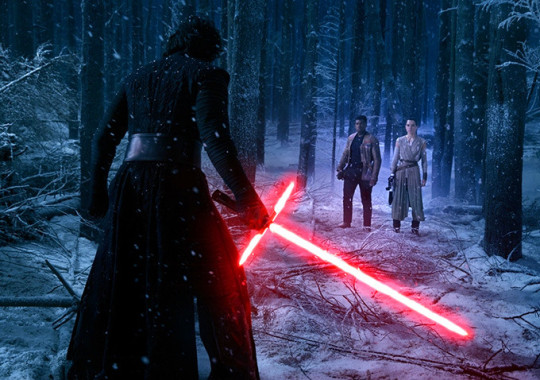
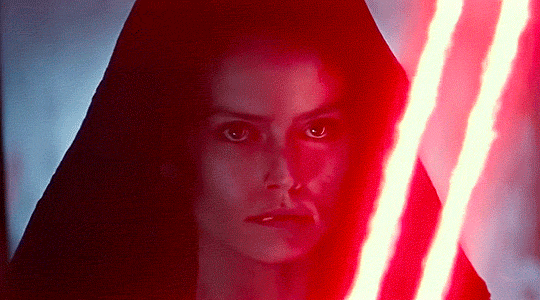
„Show me again the power of the darkness, and I will let nothing stand in our way. Show me, grandfather, and I will finish what you started.” Kylo Ren in The Force Awakens
Ben and Rey are a dyad, meaning that in one way or another, their destinies parallel one another. It was he who wanted to “finish what his grandfather started”: but it was she who actually finished what her grandfather had started. Jedi and Skywalker family are extinct; Finn may or may not be Force-sensitive, but he’s not trained. All of this leaves Rey solely in charge. And everybody cheers her, the way Palpatine was cheered when he ended the clone wars. But the dirty work had been done by Anakin; same goes for his grandson.
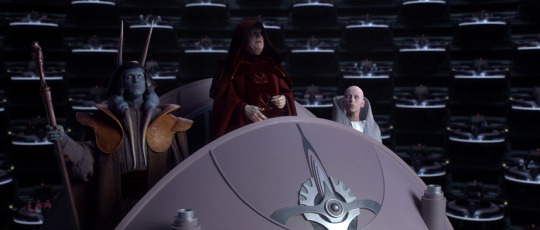
It all fits together too well: Rey was always meant to turn out evil, while the “bad guy” in truth was the hero all along. If you watch the Sequel Trilogy again and feel annoyed by their development, try to look at it from this perspective.
“Now, fulfill your destiny and take your father’s place at my side!” Palpatine in Return of the Jedi
Palpatine always needed someone young and fresh by his side to give him strength; which could be explained by the fact, finally addressed in The Rise of Skywalker, that he is some kind of clone. Not being capable of living on his own, he wanted Rey to kill him so that all of the darkness inside him would possess her, and he managed. Now he is reborn, and the young woman stepping into his shoes believes that the worst is behind her. The truth is that the Enemy is now an inherent part of her.
The good news is that by this time, Rey has also made the experience of unconditional love: Kylo / Ben saw her at her worst, but he still cared about her. Some viewers thought that Rey would be the key to Ben’s redemption, but honestly: that story had already been told with Luke and his father. The alleged bad guy saving the alleged heroine from herself is a new message in Star Wars; a message so powerful that I still didn’t get over it.
The Heir of Sheev Palpatine
Palpatine’s role in the saga tends to be downplayed although he is the mastermind behind it all: in the PT he is literally one of the first characters we see. It is easy to say that he was the devil incarnate who wanted absolute power - he also was a sly and influential politician, and after the clone wars he did bring peace to the galaxy reuniting the Republic and the separatists under the roof of the Empire. Anakin and his heirs could not make up for his sins because they were busy with their own and the Jedi’s.
As the audience, we want to see our heroes happy; yet their failures and unhappiness are often necessary.
Anakin and Padmé had to die so their children could grow up the way they did, two idealistic souls untainted by the Jedi’s sins.
Leia had to lose Alderaan, else the princess would hardly have had a chance to marry the scoundrel.
Luke had to lose his home with his uncle and aunt, else he wouldn’t have agreed to come with Obi-Wan in the first place; and he had to go through the trauma with his father’s revelation to become the wise and strong hero of Return of the Jedi.
And sad as it is, Ben had to spend almost all of his life in a dark place. The few moments of understanding he had with Rey in TLJ were probably the few rays of lights in his whole adult life; no wonder he fell so deeply for her that he would literally have done anything for her; he had to become a besotted idiot who saved the girl he loved although she had literally killed him and usurped his whole heritage.
Meaning: Rey was always meant to take over.
This is not only the story of the Skywalker family, it’s also the story of a galaxy in desperate want of balance and peace. And if you want to tell how that is accomplished, you can’t erase Palpatine from the equation. Palpatine is a “clone”, i.e. he is not wholly human; which makes him a parallel to Anakin who ostensibly had been generated without a father. Rey, flawed as she is, is a young woman of flesh and blood.
The Prequel Trilogy humanized Darth Vader; the Sequel Trilogy did the same with Palpatine. Few viewers expected this because one hardly gets interested in the villain’s bloodline. Vader’s portrayal as Anakin Skywalker in the prequels was also largely disliked because the young man was everything but cold and sardonic like the villain he became later. And as many viewers did not like to see “their” Darth Vader humanized (portrayed as a good little boy and then an ardent, stormy young man), now we don’t like Palpatine coming back in form of a young woman, who for sure is deeply flawed but not by far the monster he was. Palpatine always wanted to use Anakin’s, the Chosen One’s, power for himself; and with his final plan he managed to blend his heritage with the soul of the last Skywalker scion.
The Heir of Anakin Skywalker
Vader had to become Palpatine’s ally and to serve him loyally to make the old devil let his guard down enough for him to kill him at last, just like Kylo had to fool Snoke that he was still on his side while in the Throne Room he was silently plotting his demise. Anakin always was the hero of the Skywalker saga, a fact that is largely overlooked. His son pushed him to do the right thing, but the decision was his own, and he paid with his life.
Many fans of the Original Trilogy and also of the prequels dislike the sequels heartily because to them it “retconned” or “cancelled” what had happened before. Which is not quite true; the original heroes did find their happy ending. We witnessed what came after that, which irritates us because it’s something we usually never face once the credits roll or the book covers are closed. That does not mean that the heroes’ accomplishments are obliterated.
My guess: these fans might be right and the Skywalker saga is indeed at its end with Return of the Jedi. The saga was Anakin Skywalker’s story, and he died.
What did not die was his heritage - his sins, his excruciating pain, but also his heroism, and his prophecy as the one who would “bring Balance to the Force.” The mistake of his heirs was having wanted to go back to what once had been. Their links to the past were tenuous, e.g. we never learn how Luke came to know what had made the Jedi fail (the content of his second lesson to Rey); in any case, he must have learned it only after the fall of his own temple, in order to explain why he wanted to give up on the Jedi. Obi-Wan never told about his own faults, the clone wars, the Republic, the creation of Darth Vader; most importantly, he never mentioned to Luke that his father actually was the Chosen One, and that the Force wants Balance. It is not surprising that Luke and his friends could not build lasting peace, not knowing what had caused the conflicts. They had to fail; “failure is the greatest teacher” means that only from understanding and moving away from those failures the galaxy will (hopefully) finally learn to avoid repeating the Empire, the First Order, the Final Order etc. over and over again.
I also did not like very much what the sequels did to the heroes of the original trilogy, honestly. But had they survived, found together again, and or proven more heroic and less flawed than they were this time around, the general audience would never have stopped pestering the studios with wanting more of Han, Luke and Leia. And that’s not how it’s supposed to be. They’ve done their time; they had their happy ending. They had their hero’s journey. They ended the Empire the way they wanted, their achievements were completed. It is up to the next generation to learn from the past and build something new and better. We, in our everyday life, also have to bring the people we once looked up to (parents, teachers, mentors etc.) down from their pedestal and to acknowledge the good they did but also see their failures and limitations, if we ever want to get on with our own lives.
In this light, the Sequel Trilogy is indeed not part of Anakin Skywalker’ story. If Ben is brought back and stands good on his promise of finishing the Chosen One’s work, then it will be a new saga - his. Not his grandfather’s any more.
Though a Palpatine, I believe Rey does have the potential for finding balance and unite the galaxy. If Ben, her dyad, comes back to do his part, the galaxy will be again under the rule of two powerful Force users the way it was when the OT begin; but this time they need a chance on something united and positive.
Balance At Last?
The authors repeatedly stated that the sequels would be “very much like the prequels”: not incidentally. The prequels also were the story of a usurpation, where at the end everything that was good seemed forgotten or turned into the hand of the wrong person.
This sheds an interesting light on the next trilogy: by this logic, it ought to mirror the original trilogy.
Whatever you can say about the Star Wars saga, it never repeated itself. It has recurring themes, which do not run in circles but in spirals; like in any family, or political system, the lessons not learned always demand their price.
All of this is not to say that I like this ending. The Rise of Skywalker mostly is so dissatisfying because being Episode IX it ought to have been a definite ending, but it does not feel like an end. It feels more like a new beginning, or an interruption of a story that was largely not yet explored. The new heroes have wrapped up the past, but what about the galaxy’s future? A future that has maybe already begun with the Mandalorian’s mysterious adopted Child, who symbolizes faith where Yoda was all about (avoiding) fear?
Rey and Baby Yoda both are two younger and more innocent versions of someone we are very familiar with; and they are both paired off with someone who becomes a redeemed version of a familiar villain - Rey with Kylo Ren / Ben Solo, who is reminiscent of Darth Vader, and the Child with the Mandalorian, reminiscent of Boba Fett. Also, the Child knows Force healing, the way Rey does.
It seems to me that this must be announcing a continuation that fits to it all and brings the loose strands together. If the Force is at work, then it knows what it’s doing.
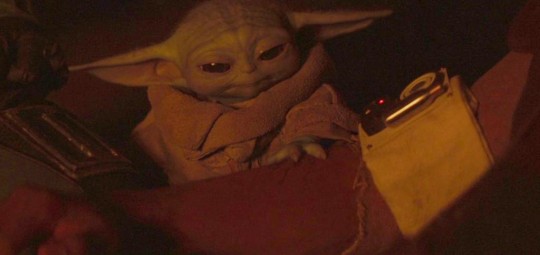
Luke was always one to give people a second chance: in A New Hope, we see him befriend literally anyone who is willing to go along. Star Wars is all about getting another chance. Are we really supposed to believe that Ben Solo is gone forever, and worse, that he deserved no better than dying after sacrificing himself for the girl he loved? Did Luke Skywalker in person come to Crait, sacrificing his life in the process, to give his nephew a second chance only for him to disappear never to be seen again?
Ben and Rey being a dyad means that they mirror one another, in every way: what happened to one will happen to the other too, eventually. The iconic “You’re not alone” is so powerful because it comes from a person who knows damn well what loneliness means. If Rey finished what her grandfather started, then so must he. When the Republic fell everybody also believed Anakin to be dead; he wasn’t. and when Han left Luke and Leia towards the end of A New Hope, they did not count on him coming back; but he did.
The next trilogy is not yet announced but it has been known for years that it’s in the cards; thankfully it’s in the hands of Rian Johnson, who already proved that he can tell a masterful Star Wars story; and who reintroduced the subject of Balance again. I still hope that this image was a foreshadowing, not an empty promise.
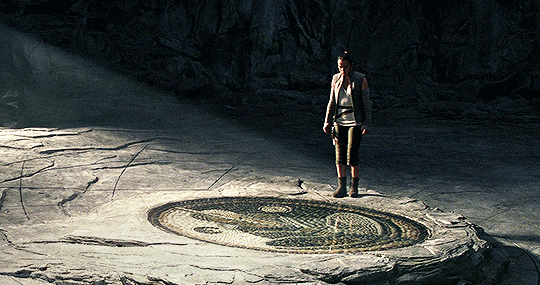
The ST doesn’t really make sense - not yet. That doesn’t mean it won’t make sense when the rest of Rian’s story is told.
“Hope is like the sun… If you only believe in it when you see it, you will never make it through the night”. Let’s keep our hopes up, fellow Reylos and ST fans. 😉
#star wars#the rise of skywalker#the last jedi#the force awakens#rey palpatine#kylo ren#ben solo#luke skywalker#yoda#the mandalorian#han solo#darth vader#anakin skywalker#balance in the force#leia organa#reylo#bendemption#baby yoda#emperor palpatine#rian johnson#read more
40 notes
·
View notes
Note
(Mod, can this anon just say I really appreciate how much self-control you have? When that Haiji defender showed up on your blog, you just said "get off my blog". This anon really appreciates how you didn't scream at them, accuse the person of secretly being a pedophile themself, tell them to kill themself or to choke on broken glass, encourage your followers to harass Haiji fans, etc. Today's generation of pop-culture-fandom could learn from your example.)
//Now that you bring this up, if you’ll indulge me, I’d like to talk for a bit about fandom toxicity.
//There is, in a way, a feeling of entitlement and ownership when it comes to characters or properties. That, because these things hold a special place in our hearts, that they belong to us and that our interpretation of them is the correct one and that anyone who disagrees is wrong.
//So when there comes creative decisions or opinions made by others with those properties, even ones by the actual creator of the work, that don’t match up to our own, there can come a feeling that these are a direct attack against us as well. With that comes a lot of the worst parts of fan culture: harassment, insults, bullying, threats, and even actual attacks on these people.
//But the truth is, these people were probably just expressing their feelings and emotions about the same work, because they enjoy it too. They were never trying to directly or indirectly attack you, they just simply had a different opinion. It’s important to keep that in mind: the people you talk to online are human beings with thoughts and feelings of their own, and those feelings are rarely going to be the exact same as yours.
//An unfortunate part of the problem are the inherent psychological biases that we all have, and confirmation bias especially. Where we’ll focus on information we agree with (even if it’s factually wrong) and ignore anything that conflicts with that (even if it’s factually correct). This goes beyond just fandom, but I’m going to stay on topic.
//There is not a single human being at any point in history who hasn’t been guilty of these biases. You, me, everyone you’ve ever met, we’ve all done it at one point or another. The issue is when these biases get us to leap toward intolerant conclusions about those whose viewpoints we disagree with. “You don’t have the same opinion as me, so you must be stupid/evil/bigoted/brainwashed/etc.”
//It can be so easy to draw those conclusions about people, especially when the arguments aren’t well-structured and you’re in the heat of the moment. But let’s be real: we’re never all going to 100% agree on everything. And that’s okay. Hell, if we did, that sounds more like a dystopian nightmare scenario where free thinking has been suppressed.
//And thinking is an activity I’ve always encouraged. Toxicity is ultimately at odds with critical thinking, where any dissenting opinion is hunted down and suppressed and anyone who speaks up is bullied into silence. That is not what my blogs are about. It does kinda make me sad that I’m being praised for not being a toxic asshole, because I don’t really feel like that’s praiseworthy. I want that to be a normal thing.
//Here’s an experiment: take your favorite DR character and ask yourself why you like them. What is it about them that drew you to them? Their personality? Their backstory? Their role in the narrative of whichever game they were in? When you have those reasons in mind, consider the following: what about this character is flawed? What about them is inherently dark or troubling? Why might someone else dislike them?
//And then work backwards from there: take your least favorite DR character and ask yourself why you dislike them. Then find all the ways why someone else might like them without diving straight into intolerant conclusions. Look past the surface and dig a bit deeper to see what exactly makes them tick.
//That’s not me asking for essays, that’s something I want you all to consider for yourselves.
//I’ll be the first to admit I really disliked Junko. I didn’t consider her all that interesting of a character or a villain, and she just cames off as very annoying and overblown to me. I considered everything that she sets in motion to be far more interesting.
//I have, however, seen a lot analyses and in-depth looks at her as a character and after going through those, I came away with a lot of insights I didn’t even consider before. My opinion hasn’t changed too much, but I can definitely see (DR3 notwithstanding) all the way she can and does make for a interesting villain.
//So the takeaway is, even if you don’t end up changing your opinion, you can at least say “I still disagree, but I’ve gained some perspective into why someone would feel this way and I’m better for it.” Critical thinking does not mean you have to give up your opinions, and there does exists a very wide middle ground between total agreement and toxic harassment.
//But critical thinking is at odds with the idea that it’s best to retcon, ignore, or fabricate details of canon that we disagree with to justify those opinions. This is why I got so mad at the anon who claimed Haiji was talking about fictional underage girls, something that is not at all substantiated by evidence in the game. You can’t simply ignore these details because you don’t like them.
//Critical thinking is about being able to either say, “Okay, I fully acknowledge that these details about this character I like are problematic and I understand why it might upset people, but they’re not the sole or central reason why I like this character”, or “Okay, after careful analysis, maybe I was wrong about what I originally thought about them.”
//Me personally, I look at these details and ask “Okay, but how can we build off of this? Can we tell a new story with it?” For example, while SDRA2 Chapter 0 left a bad taste in most everyone’s mouths, I didn’t want to just retcon it. Instead, thought Kokoro being regretful over her actions and wanting to reconnect with her daughter would make for a very interesting story.
//But the most important part of this that I’d want anyone to take away is that it’s important to listen to others and consider their viewpoints as well, and again without immediately jumping toward conclusions and talking over them before they make their case. Listen to people, ask them questions, and remember that on the other end of the conversation is another human being with thoughts and feelings of their own.
//Now, there is that invisible fear that “understand that others have different opinions” is shorthand for “just accept that some people are into r*pe/inc*st/p*dophilia and let them make content of it.” I promise you that is not at all what I’m suggesting here. I hope my previous angry rant about Haiji cemented that fact.
//What I am saying is that we need to be acutely aware of both the thoughts and feelings of others and those of ourselves. That it’ll be better for us as well as others to apply critical thinking and careful insight into our opinions, not taking them as inherent fact simply because we hold them, and understand that others will not always enjoy the same content the same way we do.
//And most importantly, being able to separate those who are willing to listen vs. those who’ll prefer to stay toxic, bitter, and unmoving is a very important skill to learn. There is no shame in withdrawing yourself from any sort of talk with a person who upsets people for fun, and it will be better for your health in the long run.
//Finally, let’s be real, what’s gained from arguing with people online? People who you never have and probably never will meet? Not much. But if someone is not going to budge and only wants to share their toxicity with the world, it’s better for you to simply walk away, block them, cut yourself off, and move on. Their toxicity is their deal, and it doesn’t have to be yours.
//But I also think there are people who are willing to listen, who may simply not know that they’re engaging in things that are hurtful or toxic. And some frank but kind insight as to why can change their opinions. A willingness to listen, not to just defend their position, is what’s important.
//I’ll be completely honest here and say I was in that position once. I’ve said and thought some awful things before, and I feel so fortunate that I met the right people who stopped me from going down that road before I got too far. Not with hostility or arguments, but honest and kind discussions and insights.
//As fans and as people in general, we can, should, and need to be better. That’s why I don’t want my space to be full of hate and bullying, but just storytelling and creative discussions, where people are welcome to express their opinions, and even if we disagree, that’s alright. We’ve at least gained some insight into each others’ views ^^
//Compassion and wisdom are what I consider the most important virtues, and being more critical of ourselves is how I think we can solve the issue of fandom toxicity. That’s what I’ve tried to apply here. My goal is just to tell a good story for you all to enjoy here, and I appreciate each and every one of you who’ve followed, liked, reblogged, or even just considered any of my posts worthwhile to read
//And if you made it all the way through this, I hope you’ll consider everything I’ve said here as well. You can’t change every single toxic person out there, but you can change yourself for the better and encourage others to do the same.
#mod talks#mod rambles#a student out of time#I didn't have any bad experiences recently I promise#this has just been on my mind for a while and I felt like sharing#Anonymous
20 notes
·
View notes
Text
Doctor Who: Why Jodie Whittaker’s Doctor Needs an ‘Everybody Lives!’ Moment
https://ift.tt/39pw5MX
Doctor Who! The children’s own show that adults adore.
Doctor Who, as a format, requires an intrinsic joyfulness in its stories to be so adored. If adventures become too continually grim, or not sufficiently fun, then ultimately there’ll be a tipping point where it becomes implausible for the story to continue. Why, ultimately, would the character keep travelling if they weren’t enjoying it? And even if they did, would this be something that would sustain a family audience?
It’s not that you can’t have darkness in Doctor Who, it’s just that it can’t be sustained and eventually something has to give. As such, there’s an inherent optimism in a lot of Doctor Who, even in episodes where it isn’t high in the mix. For the show to make sense, there has to be some hope that wrongs can be righted.
For example: even though William Hartnell’s Doctor starts off trying break his own programme by getting rid of Ian and Barbara as quickly as possible, the show quickly settles into “a great spirit of adventure”; the Second Doctor comforting a grieving Victoria by pointing out that “nobody else in the universe can do what we’re doing” followed by the Doctor letting Victoria leave the TARDIS because it’s the best thing for her. In both cases, the gesture is one of compassion. The Fourth Doctor refers to Sarah Jane Smith as his best friend and she only leaves because he has to go somewhere she can’t (His home planet of Gallifrey, something that on original broadcast had more dramatic weight as he’d only visited it once before in the series and then been forced into regeneration and exile).
When Russell T. Davies relaunched the show in 2005, the unspoken idea became explicit. “Can I just say: travelling with you…I love it,” says Rose Tyler, who – despite portentous trailer statements – survived her travels. In episodes of The Sarah Jane Adventures Russell T. Davies expanded on the Tenth Doctor’s victory lap in ‘The End of Time‘ to make it more celebratory, giving past companions happy endings (some in stark contrast to their grim fates in Nineties’ spin-off media). The departures of Rose and Donna are tragic, but the journeys to get there are framed in terms of joy and excitement.
The next showrunner, Steven Moffat, preferred happy endings. Companions had previously been married off (Susan, Vicki, Jo, Leela, Peri) as they left the show. Amy Pond got married and stayed, travelling with her husband. This was a leap forward, but unfortunately the following series’ pregnancy storyline was handled poorly and attempts to deal with its repercussions were not successful either. Clara, the next companion, dared to be like the Doctor but unlike Donna managed to both die and have a happy ending.
Moffat enjoyed Immortal LGBT+ Women Having Adventures in Space so much that he used it again for Bill Potts in Series 10. An important aspect of both characters’ storylines is that they suffer a terrible fate, but the version of Doctor Who in which companions die is rejected in favour of one where they get what they live happily ever after. Moffat, a comedy writer to his core, was unwilling to make Doctor Who a story where travelling on the TARDIS left you in a worse place. Davies also tried to give his companions happy endings of sorts to ameliorate their loss.
If we look at the populist peaks of the show, Doctor Who has never been overwhelmingly cynical. Whenever it’s been taken in a darker direction it usually rejects that approach in favour of a lighter balance. In Season 21 the show put its characters through a series of almost unrelenting grimness (‘The Awakening’, the story where a demonic entity attempts to get an entire village to slaughter each other is the light and fluffy one) culminating in the Fifth Doctor’s heroic regeneration story ‘The Caves of Androzani’– voted the best Doctor Who story in several polls – where the Doctor goes to extreme lengths to save his companion and distances himself from the violence that surrounds him.
And then in the next story ‘The Twin Dilemma’, the Sixth Doctor strangles his companion.
Read more
TV
Why Doctor Who can’t sustain dark storytelling
By Andrew Blair
TV
Doctor Who : Revolution of the Daleks to Air on New Year’s Day, Trailer is Here
By Louisa Mellor
Taking ‘Grimdark’ storytelling to mean stories in which violence and misery is perpetuated throughout the story universe in a seemingly never-ending cycle, that period in the show’s history is a perfect example of it. Why diminish one of the finest stories ever by immediately negating the heroism involved? Why would you have the main character reject the violence that he’d become a part of only to immediately embrace it again? Among the many problems it means we have a Doctor/companion relationship that seems grim at best. Why would you keep travelling with someone who strangled you, refused to apologise and then continually harangues and shouts at you? I don’t watch Doctor Who to see the companion trapped in an abusive relationship. I also don’t think it’s a coincidence that the ratings went down as the production team systematically removed as much hope from the show as possible, ridding it of that great spirit of adventure. After ‘The Twin Dilemma’,the show was put on hiatus, and ultimately cancelled.
Which brings me to the current version of the show.
I don’t think Jodie Whittaker is miscast or that the current version of the show is woke nonsense – which is a relief because I think using the phrase ‘woke nonsense’ unironically is quite the red flag. I think that the enthusiasm Jodie Whittaker has for the part hasn’t been used well, because we currently have a Doctor who is great at showing unabashed joy travelling the universe, but whose stories lean towards grimdark and don’t give her anything approaching ‘Everybody lives!’
One of the most lauded episodes in Series 11 is ‘Rosa’, which was co-written by Malorie Blackman and showrunner Chris Chibnall. In it, the TARDIS crew see Rosa Parks in the run-up to her being arrested for violating segregation laws, and need to stop Krasko – a mass murderer from the future – interfering in this event and stopping it from happening.
The inclusion of Krasko makes an interesting and depressing point in this story, and I’d be fascinated to know the villain’s development in the writing process. For what we have here is a story about an important act of defiance that changed human history, and is celebrated for its impact, alongside an acknowledgement that there will still be racists in the future. In fact, there will be racists who murder 2,000 people in the future. Racism and its associated violence is not, the episode says, going to go away.
In isolation this might seem like optimism tempered with caution, but since Chris Chibnall became showrunner, edgy, provocative ideas have crept in and given stories a cynical edge. Small moments have a cumulative effect, such as Epzo’s story about his mother in ‘The Ghost Monument’, Robertson surviving ‘Arachnids in the UK’ without learning any moral lessons and indeed likely to cause more suffering, ‘Kerblam!’ ending with the system that blew up an innocent woman being allowed to continue (while closing the warehouse for four weeks and offering employees two weeks’ holiday pay), Daniel Barton escaping freely in ‘Spyfall’ while the Doctor wipes the memories of someone doomed to die, ‘Orphan 55’ shows us the unavoidable destruction of the human race, as does ‘Ascension of the Cybermen’. Under Moffat, we had some episodes ending with cynical quips that left a bad taste in the mouth, but under Chibnall the bad taste is there before the outro quip.
Series 11 showed us a joyful Doctor in a nasty universe, and the latter regularly overwhelms the former, but at least ended with Graham and Ryan clearly rejecting murder as a solution. Series 12 was less focussed on real-world evils, and uses them on the fringes of its storytelling (with the Doctor now seemingly embroiled in the universe’s cynicism, using Nazis to imprison a Master now played by a British Indian actor), but we’re still getting real issues reflected back at us along with the message that the Doctorcannot sort this, which is based on the false assumption that this is what Doctor Who is for.
I hope that this is building towards a reversal, that the Thirteenth Doctor gets her Androzani moment where she gets to take a stand against everything that she’s seen. However, we have now had a fully grimdark finale as the lasting impression of Doctor Who for nine months. ‘The Timeless Children’ has proven controversial for its approach to continuity; as well as the retcon of the Doctor’s history this was a ‘Twin Dilemma’(also the last story in its season) to ‘The Day of the Doctor’s Androzani. The heroism is now nullified. When we watch ‘The Day of the Doctor’and the day is saved at the end of the story, now we know all the Doctor has done is defer those deaths (those two billion children’s deaths) and the cycle of violence will continue. At the end of ‘The Timeless Children’the following is presented to us as the good guys winning:
The heroine cannot bring herself to destroy the animated corpses of her entire species, so Joe from Derry Girls has to do it for her. An entire planet now a lifeless husk. The main character’s centuries of trauma are revealed. Their best friend is now a genocidal maniac.
cnx.cmd.push(function() { cnx({ playerId: "106e33c0-3911-473c-b599-b1426db57530", }).render("0270c398a82f44f49c23c16122516796"); });
This is Doctor Who in 2020: violent, cynical, cyclical. A mirror when it should be a window. If Series 13 repeats these trends then I fear history may repeat itself once more. But then, what is Doctor Who mostly about if not seeing a cycle of oppression and then breaking it?
The post Doctor Who: Why Jodie Whittaker’s Doctor Needs an ‘Everybody Lives!’ Moment appeared first on Den of Geek.
from Den of Geek https://ift.tt/39z4Rn4
3 notes
·
View notes
Text
When relevancy goes too far
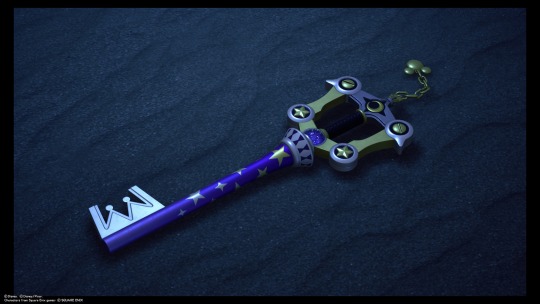
Relevancy is a bit of a complex topic the more you think about it. How far do you push it? Which parts of a story are needed to know the other? How should something define the follow up? These questions have widely different answers depending on the person and especially depending on format.
Hell, if you wish to nit pick it further, even the series in question is a factor. Some series’ thrive on whats done while others drown in their own scripts. I believe Kingdom Hearts is one of the latter.
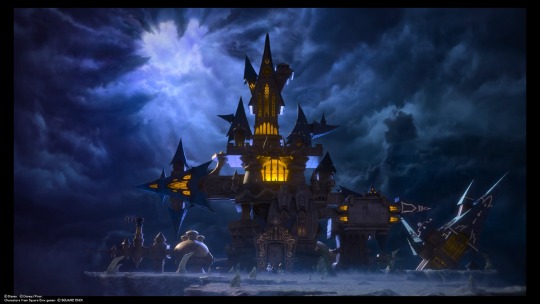
That said, I am not someone who hates KH’s expanded stories simply for existing. The “side games” in of themselves aren’t bad nor is the idea of using such things to expand a world. The same could be said for game novels or comics in my opinon.
However, these things can be a slippery slope or a lazy exist. For example, Assassin’s Creed threw out it’s whole Juno arc into a comic just to get it out of the way which completely shattered my investment.
In turn, Nomura himself isn’t at fault for as much as we bash him for. Something he’s admitted himself as seen here;
So, the new Days is one of the three titles announced in the Autumn of 2007 as new projects in the KH series.
Nomura: Those three titles were all announced at the same time, but in reality the opportunities for the projects were raised in a disjointed way. Birth by Sleep is a project that was raised within our company, but Days is from Nintendo, and coded is from Disney, so we started by talking to each of them.
-source <--Link btw
And anyone that’s read interviews out of curiosity will know that there’s also factors like how ‘Birth By Sleep’ was shifted from PS2 to PSP or that ‘Chain of Memories’ wasn’t a planned title either. (seen here)
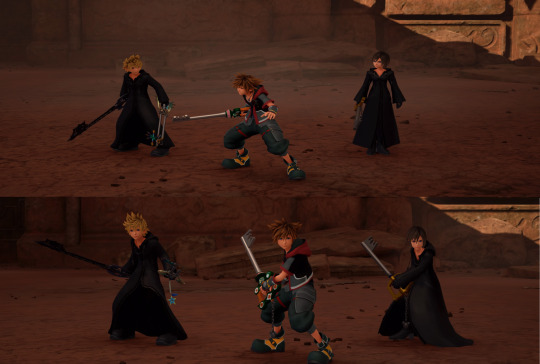
So if these things aren’t inherently bad or planned that begs the question of why it’s a problem here? At least in my opinion of the series.
The answer is simple and it lies solely on Nomura’s shoulders for it as a fault, relevancy. The man goes out of his way to make each and every game, concert, or otherwise is attached to the series in some meaningful way going forward.
Naturally, any expanded media is tied to the main narrative in some way. I know this, I am not that foolish. The problem is that Nomura makes them plot relevant going forward.
These titles can’t be true “side games” because they dictate the story going forward in some way. It’s for this reason the more radical fans hate to hear the terminology “side game” to begin with.
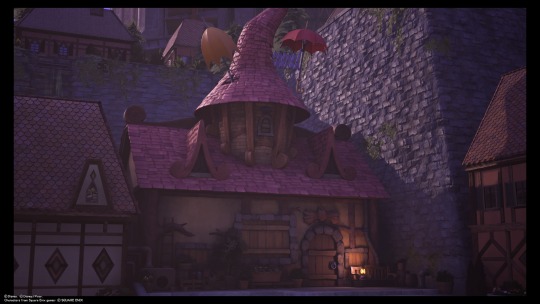
This problem was especially bad for years because of how spread out the series became among other gaming systems. And while some like to say it’s fine now due to the collection discs I dont think this will last long given the “phase 2″ images released for KH’s near future.
Hell, I’d even argue this problem isn’t even fixed in truth because the current KH story involving Foretellers, Luxu, and so on is all things spun from a mobile game. Yes, you have to sit through scenes on YT or play a mobile game to fully grasp that cat creature (Chirithy) you saw in KH3.
Naturally, it’s much easier to watch the scenes on YT these days but that also feeds into the loop of not paying for the game itself. I personally see no issue with it but companies are much worse in recent years for shutting down Youtube channels over loose definition of “piracy”.
No game series is worth several consoles. Of course, I’m just speaking from experience, with KH now on the Xbox this may be a moot point in a few years.

I am rambling, off track, lets focus. “Why is this an issue?” is what you’ve read this far for me to explain. The biggest issue with this poor decision making is how it harms the main narrative you’re telling.
For comparison, look at Sora in KH3. He’s often confused by people he doesn’t remember meeting or events he doesn’t remember nor took part in. This is roughly close to what it would be like for someone that’s only played KH1, 2, and 3.
Sora has that same level of insight including what he was told about others like Roxas or Aqua but other characters in-game. This feeds into KH’s misconceived air of complexity.
Kingdom Hearts, as a story, isn’t that complex. It has deeper themes it throws to the wayside but it is easy to follow if you play most games in some form. This ties back into how the series was handled up until the PS4/KH3.
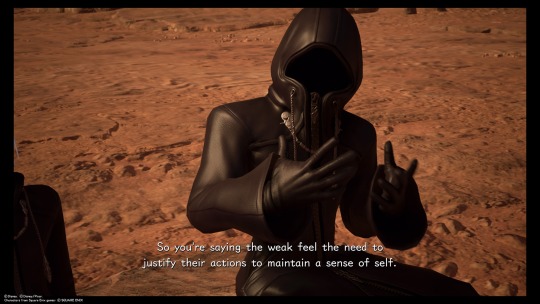
Ever want to know who Roxas was in KH2? Well you had to play Days or you can sit through that horribly boring 3 hour movie on the Remix disc. Even then, the Roxas you see in Days wont be like the one in KH2.
Wish to know who Xehanort was? Play Birth by Sleep! All three campaigns with little variance. Then once you’re done get ready to sit on YT or download a phone app and play Kingdom Hearts Dark Road.
The Foretellers, Luxu, or the Master of Masters? That’s another set of hours, if not days, with the KH Union X Cross, KH Dark Road, and should you choose you can even watch the Back Cover movie which answers nothing at all but shows you the Foretellers in Kh3 graphical glory.
You wish to know how Namine knew who The Lingering Will was? Well dig up a fan translation of a script the Japanese voice cast read for a music concert event. (yes that happened)
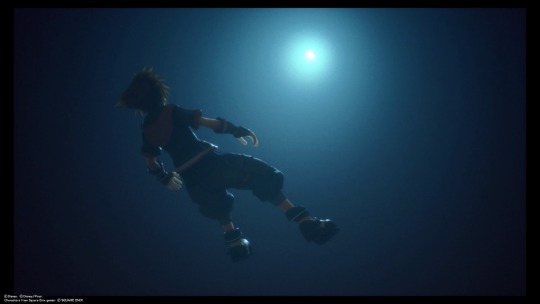
You can see where this is going I assume and this is just scratching the surface by the way. You wish to know the finer details like Keyblade types, the inconsistent time traveling, “recompletion”, and so on then be prepared to read word of god interviews, in-game dictionaries/journals and always be ready for a few to change.
Whether it’s a true retcon or just an ambiguous statement, the series is ongoing, Nomura heads the ship, and he is by no means obligated to stick to previous statements if he can make a new one to alter those events.
Then again, holding too much weight in words said outside the game itself is a faulty way of doing things that most fans (like me) have fallen victim too at least once.
At the same time, all of these things are relevant by Nomura’s decision. Sure, the remixes have fixed this to a degree but it’s anyone’s guess for how long. Better yet, at what cost did the remixes fix anything?
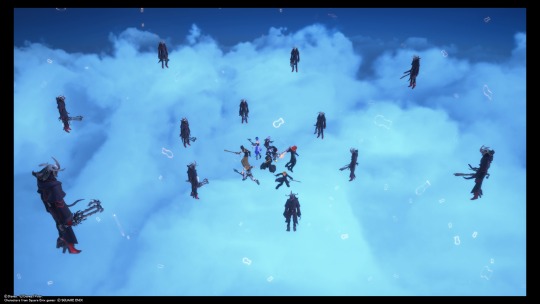
The best example of what I mean is Coded. It was originally a game for phones. At the time, only Japan had a phone capable of playing it. Feeling that a shame the game later found it’s way to the DS for all fans to play.
At this point in time Coded was the only true example of a “side story”. It was by no means necessary. The whole datascape plot was more convoluted than it needed to be despite data!Sora being far better than the original at this point, and easy to miss.
But...well that was good. The DS version of Coded was fun as hell to play. The only version of the “command deck system” I’d consider worth any semblance of praise. It did it’s job of getting some level of fans invested such as my friend @blackosprey and it’s story was missable.
You did not need to play Coded to understand Dream Drop Distance or further. This was perfect. This is what games like Days, KH Chi/UX, 0.2, and DDD should’ve been.
Games that reached out to grab new people, games that played around, and games that expanded on the main narrative without dictating it’s direction. A side game is something that exists alongside or outside your main story.
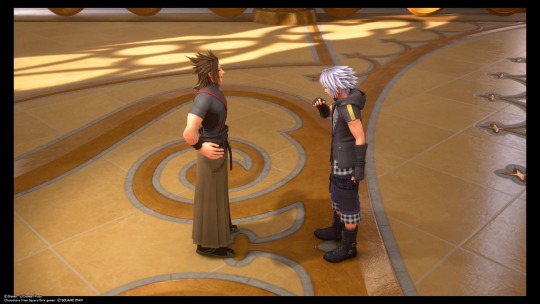
However this isn’t what we got. 0.2 A Fragmentary Passage was a short sequel to BBS but also a pretty tech demo for KH3. Dream Drop Distance was there to show the real Sora that people needed help and to show us that Xehanort was back.
KH Chi was a browser game meant to show the Keyblade War and how it shaped Sora’s era. Now it’s an ongoing curse on the series with time traveling plot that affected KH3 directly.
Coded was made into a movie you needed to sit through thanks to one small newly added scene. Days lost many small interactions it’s fans loved in the transition to a movie that is hard to sit through.
I’ve also heard KHDDD and 0.2 were “shaved off” KH3 in a sense to be their own titles...this...this makes so little sense.
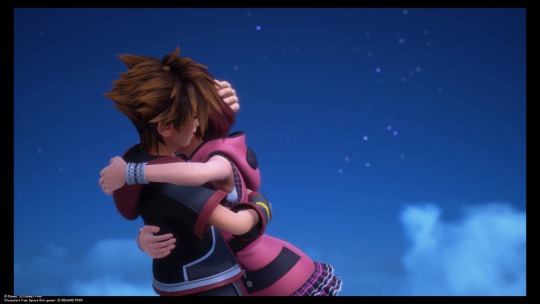
Nomura calls KH “Sora’s story” but this is a lie. If it truly was Sora’s story then your main narrative would be BBS, KH1, CoM, 2, and the original combined form of KH3. That’s the titles he’s relevant, those are the titles he stops Xehanort’s plans.
These other titles could’ve been so fun but none of them were truly allowed to breath and be themselves. They were weakened and limited by Nomura deciding to prop the ongoing story upon them like they’re stilts.
Then as a result you can’t close out KH3 without resolving all of these other events and characters which drags it’s own story down. KH3 feels all over the place because it is. It’s trying to tie as many knots as it can from threads created in titles that were way more relevant then they needed to be.
Kh3 can be seen as a clean break for many but I see it as a matter of time. KHUX and now KHDR are still there casting a shadow, dictating what comes next. Melody of Memory is one of several games planned for an unknown but hopefully more thought out direction.
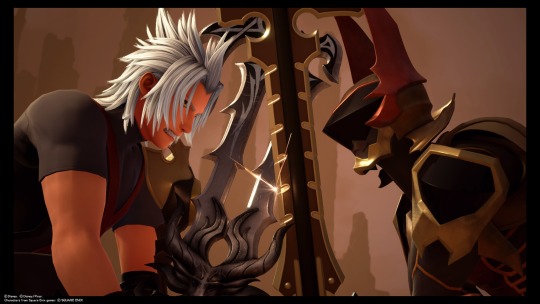
I worry I haven’t explained what I meant well enough but moral of my story is that making things too relevant hurts not only your main story but these new stories you wish to explore.
You can’t have a story and it’s cast breath if you’re tying a knot of mythos too tightly around their necks and this is a tragedy to me. KH began life with such potential but it constantly holds itself back because so few entries into it’s story are truly just an entry.
And I am not saying games can’t follow up one another nor that they shouldn’t. What’s needed is a clear idea and some breathing room. A good example would be to save people in Days with the game DDD. DDD could’ve wiped away some clutter to focus on the final Xehanort battle in a sense.
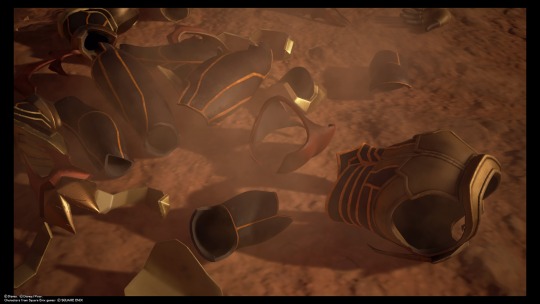
Nomura has a huge problem with wanting connectivity without letting games be connected by the name alone. It’s like he wants to do the opposite of what Final Fantasy has done but to detrimental results.
This harms so much but worst of them it hurts development. Because Days was made so important, we had a movie made. Because Coded was elevated, a movie was made. Because the keyblade war was so popular, Union Cross was made.
The Remixes would’ve been better to consolidate lore not waste time trying to appease every whim. KH’s relevancy is a huge problem and I doubt it’ll stop any time soon.
4 notes
·
View notes
Text
Ghost-Spider #3 Thoughts
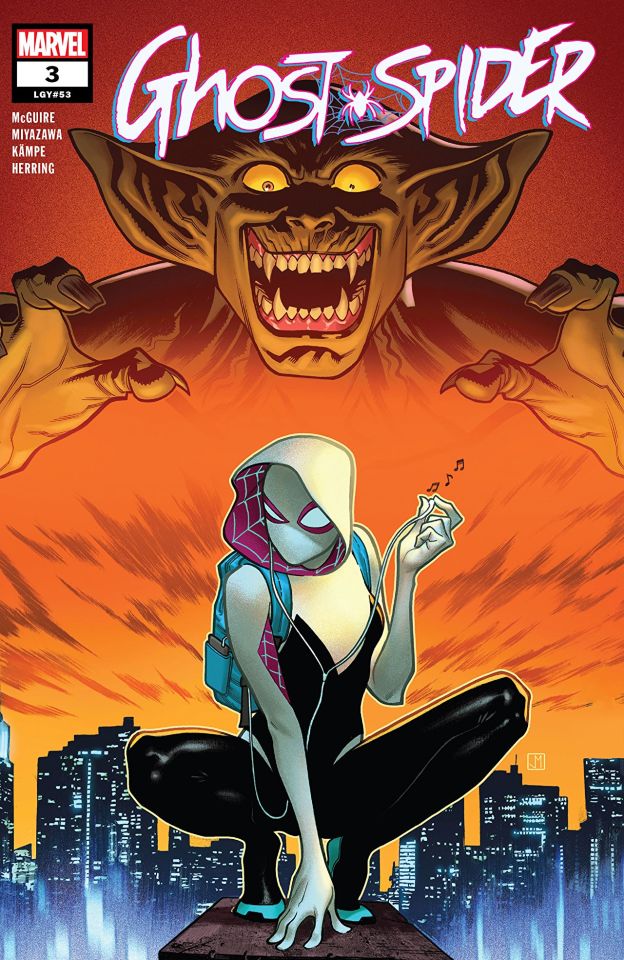
More of the same but now with extra smaller problems.
You know my complaints about the inherent premise of this title? Those still stand, just take those as read from now on.
This issue compounds those problems though through a several smaller problems that in isolation might be merely nitpicks but collectively speak to how ill thought out this book is.
We finally get John Jameson after he’s been talked about for 2 issues and wouldn’t you know it there is little fanfare. It’s not a character introduction because this book isn’t written for new reader’s it’s written for the old lapsed ones who apparently still know what happened in the previous volumes
When John threatens Miles the latter retorts John is scarier when he’s bigger than he is. But John is clearly bigger and more dangerous than Warren. John is a man in his 20s or 30s and Warren is some middle aged nerd.
This dialogue refers to Earth 65 Peter Parker as a mad scientist and implies he had something to do with Spider-Gwen’s creation. It plays as rather intriguing..if you never read older Spider-Gwen issues…like her origin! Peter didn’t create Spider-Gwen at all unless there was some huge retcon I didn’t know about. Moreover this book is again presuming familiarity on the part of new readers. If you hadn’t read the older volumes this dialogue about Peter makes no sense and gives you a false impression.
Gwen claims that in Peter’s dimension people don’t look up which allows for her entries and exits from Earth 616 to go unnoticed. But this is dumb because if you live in a world of super humans where death could come from above you absolutely WOULD look up from time to time!
At the start of the issue Gwen is happy that she’s learning important things that don’t involve punching people but then towards the end of the issue she’s explaining how well things are going and how her day would be perfect if she COULD hit someone. Isn’t that a little contradictory?
The art has stepped down and isn’t as tight as in the first 2 issues.
Peter is surprised to find out Gwen’s clothes are made from her symbiote. Peter is too smart to have not deduced that. It’s really obvious considering he, Brock, Kasady and literally everyone else who sported a symbiote didn’t mother with much more than underwear.
Speaking of obvious deductions. It turns out Benji Jones is in league with the Jackal because she figured out who he was…So…a teenager could see past his brilliant disguise of growing a beard on his chin and changing his name…but literally nobody else could? Staff members at ESU haven’t recognized him at all? Even if they weren’t around when he worked here for God’s sake there’d be systems in place to check considering he’s one of at least two ESU staff members who have become notorious super criminals. Especially if Tony Stark is involved in funding a student program for extradimensional or extraterrestrial people!
Is Benji really just evil because she wants to be a furry and protect other animals? That’s a backstory in desperate need of elaboration because as is, it’s asinine.
Miles Warren has contacts in the criminal underworld and in his debut as the Jackal literally recruited the help of the fucking Punisher. But the best way to find out where Gwen lives is through a teenage girl who wants to be a furry. Couldn’t he just hire/clone a private eye or something. He doesn’t know Gwen has powers so he wouldn’t be worried about her spider sense. Speaking of which…
How the fuck does Gwen’ Spider Sense even work? It alerts her to Warren, the guy who doesn’t want to hurt her (just have creepy sex with her) but it stays quiet about Benji. The (kinda dumb) reason Warren doesn’t set off Peter’s spider sense is that Peter considered him a friend (although an 80s flashback implied Warren did set it off a little one time). So Peter’s spider sense doesn’t react to a guy who wants him dead so he can shag his girlfriend purely because peter doesn’t consider him an enemy…but Gwen’s reacts when he doesn’t want to hurt her and he’s a stranger to her…but it also doesn’t react to a girl she’s known for 2 weeks and who’s been spying on her since her first day. WTF! It doesn’t even alert her when Benji is in her furry form and spying on her portal.
Warren is being super unreasonable even for him here. He punishes Benji or failing him when she failed specifically because she had no means of dimensional travel and because she was working off the incorrect information he gave to her!
Warren claims Gwen really is the genuine article when he finds out she’s from another universe. Okay first of all, unless I am mistaken wasn’t he aware of Spider-Gwen way back in Clone Conspiracy. He’s literally met her before. Second of all if he is aware of parallel universes (which I’m pretty sure he was before this doesn’t that really destroy the idea that this is his Gwen? That means there are an infinite number of ‘real’ Gwens out there. Thirdly, like I have said before, Warren considers the clones of Gwen as the real thing anyway. That was the whole point. Cloning her was in his eyes a form of resurrecting her.
The dialogue about the Web of Life and Destiny not only reminded me of that shitty Slott lore but worse tried to imply Spider-Man’s life is literally guided by destiny. This is awful and undermining for his and everyone else’s character as it’s saying his free will was irrelevant until Spider-Geddon! I don’t think it’s bad for peter to BELIEVE in destiny in his life, but the idea he is literally guided by it, that Gwen Stacy and Uncle Ben were ALWAYS going to die regardless of his choices is horseshit and invalidates his entire life philosophy.
Bodega bandit, who annoyed me in Latour’s run, returns and wouldn’t you know it he’s not properly introduced for new readers.
On the one hand I like that Gwen feels guilty about Bodega bandit but then thinks it through and realizes things would happen in her universe no matter what. On the other hand it’s a flimsy attempt to justify the premise of the title because YES Gwen not protecting HER dimension is irresponsible. Peter Parker would leave his studies or down time to go out and deal with a crisis if he had to. Gwen can’t do that because she’s utterly out of the loop on Earth 616.
Gwen comments that Bodega Bandit was bound to be hurt eventually because he is a career criminal…but he was hurt just buying some pet food. It had nothing to do with being a criminal.
Apparently Benji’s serum to turn her into a furry is decades old and was obtained by Swarm. Once more there is no contet for new readers as to who the fuck Swarm is and even for those of us who o know this is poorly explained. When, where, what did Swarm do to get this thing and what even is it? Why is there a decades old serum to turn you into a furry and how and why does a teenager know about it? In summary this book continues to be a drag. Not recommended.
3 notes
·
View notes